#the end of the poem or near the end was like about how all rivers get back to the sea
Text
saw someone reciting a poem over a video and it was about how a love that burns isn’t actually good bc it won’t last long and how a river is a better comparison and isn’t that such bullshit lmao
stars burn for billions of years, more than enough warmth and passion for a lifetime
rivers however, will wear you down and reduce you to a mere grain of sand when you were a mountain before
#and I guess isn’t that how love works??#what’s good for someone will be agonizing for someone else#what’s boring may be contentment#y’know???#anyway#the end of the poem or near the end was like about how all rivers get back to the sea#and that’s also dumb!!!!#the fucking ocean????#with a constant push and pull and the tumultuous nature of the waves?????#no thanks!!!#(fires are also just as violent but like I digress)#(At least you know they’re dangerous from the outset)#(when you might’ve gone sailing on calmer waters only to enter a storm)
0 notes
Text
What About Us? A friendship psychic reading.
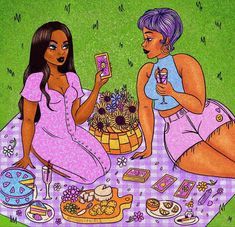


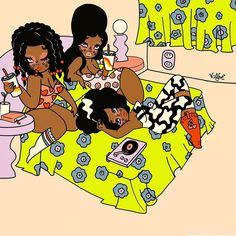
LEFT (1-3)
RIGHT (2-4)
The friendships we create are the ones most needed in our time of growing up and finding who we are in this world. For some of you, your new friendship group is coming. For a lot of you, current friendships need relearning, reshaping, and refocusing. There may be something going on under the surface, and will prepare to bloom soon come. Since this is the summer months, I would like to do something for friendships as love is always on our minds, but a platonic love that touches the stars is always certainly going to be harder to find <3
Anywho, without further a due. We can get started. So I hope you picked which one you feel the most called too. Lets begin ;)
Group 1 : This is for us. The beginning to the End.
If you have picked the one, its time to start a new friendship with someone new. You could be getting ready to go back to school in august, you could also be in groups (text chats, social media groups, volunteer groups, etc.) and this will be how you meet this new friend. You guys could go to the same school, university, job, career, or you could have found them when you were going to a concert, a park, event. you get my drift.This new friendship is going to cost you the old one, because they need time to figure out for themselves what they are lookin for in love, romance, friendship etc. and you could also be in a romantic partnership but also needing more platonic love to hit your corner.
All in all, this new found friend could be a soulmate of some sort. you guys just get it. Y'all know what y'all like and you guys pat each other on the back from time to time. It seems like you guys have known each other for ages, but its only been a few weeks/months.Plan a date with this person and see where things lead! Go shopping, go out to eat, go to a flower shop. Being spontaneous is how you'll meet.
Keywords: 111, Santa's Hat, 333, Bunnies, Awareness groups, Veterinarians, Poem, Talent shows, Concerts, Zodiac signs, Remember, Museums, Poetry nights, Sculpting, Movies, Fun nights, 666- Venusian pleasures, More life, Jumping for joy, Leo, Moon, Flowers, Pottery & Puppets.
Number sequences, 111, 333, 666, 717, 999, 1010
Group 2 : Crossroads, More to come in the Future.
So with this group, there is going to be a need to explore out of your home state, or maybe you may go to their home state. If you guys have been feeling bored this summer, then maybe its time to plan a trip somewhere like going camping, going to the river, or simply finding joy in new spaces. I feel a rekindle coming up for this group as well. Some of you may have to forgive somebody and vice versa. There could be a familiarity with this group, and the type of friends you want for yourself can come in the near future if you act more confident and free.
The more bold you are, the more the right people notice you, and then a friend group can commence.
Keywords: Crossroads (movie), Tumblr girl, Pizza dates, Online buddy, Road trip!!, Computers, Classroom, Video games, Anime, Donkeys, Cheetahs, Dragons, Beyonce.
Number sequences: 333, 888, 917, 326, 414, 909, 323, 7777, 8888, 2020, 2222, 2121, 3232, 101
Group 3: Where the wind goes, I'll become of you.
This is a beautiful connection! It's like a hippie type of love between the two of you. Just vibing with the waves, and not carrying where it takes you next.
You guys have a capacity to know what each other is thinking, a type of telepathic connection. A long lasting platonic energy between you and them. Gifts, talents, and abilities skyrocket when your with them because they boost your self esteem and help you along the way. This friendship group needs no reshaping, just simply being able to enjoy each others presence every time they meet.
Keywords: 1111, dream reality, riding around town, enjoying each others company, mountains, hike trails, forgiveness, compassion, 'im having the time of my life', 19 years old, cannabis, margaritas, dancing the night away.
Number sequences: 111, 222, 1111.
Group 4 : Let's have a girls night !
This group really needs to let go and let there hair down. Its time for a nice night with the ladies. You may need to get something off your chest, and thats what friends are for! You gotta get up out your comfort zone, and try hanging with your friends a lil while longer, you never know what can happen when you guys are together!
Keywords: Luxury dates, Club hopping, Sleep overs, Wine, Boy problems, Pajamas, Girls trip (movie), Cabin trip, Banquet, Movie nights.
#psychic reading#tarot#mystic#hoodoo#mystic reading#mystical message#free readings#tarot witch#witch#witches of tumblr#intuitive reading#pick a photo#pick a pile#pick a color#pick a card
44 notes
·
View notes
Note
Hi Cas!!!
Recently i wrote a poem and decided I loved it and send you an ask with it 2 days ago but i think it got lost or smth.
Little backstory here so I live in a family full of artists and very creative people so sharing my work always made me self concious since I always compared my work with theirs. Turns out I also have a problem with openly sharring my work with others which is a bit of a problem considering I need to do share my work for school. Because of that I've decided to share my poem with someone cause I'm really proud of it but I also want someone to tell me their honest opinion/feedback. So here it is I guess??? Also english is not my first language so sorry if there s any mistakes 🦖
Earth breaking beneth my feet
Hands holding my arms
While pushing me down
Sinking into the ground
Divine paintings flashing before my mind
Their meanings going up my mouth
Watching me choke down all the noble words
Blocking their way out
Only to laugh
As the Devil listens to all the broken sounds
Coming from my eyes
Crimson tears staining my cheeks
Honey dripping from my lips
Straight into a vase near my feet
Angles are gathering the golden liquid
Collectiong memories I missed
Reminding me things I did
That are straining my guilt
People I left forgoten
Are sitting faceless
Waiting for my jugement
God is listening to everyone
Except for me
As I bleed out on a light floor in front of him
Staining red everything I could see
While room fillds with blood
That's comimg from my wounded heart
Drowning me
Ending my tortures
While our outstanding preformance goes on
The capitol's laughing
The kids are dying
But why do I care?
About them when I'm away
Maybe these scary meaningfull portraits
Maybe paintings that left me empty
Are happening somewhere on Earth
Someones mother is dying
But all we do is drink honey
Someones child is fighting
But all we do is play a song
Song of Army Dreamers
And say 'scary things happened years back'
While ignoring the fact
That those things are also happening now
Somehow I made a poem about war with my religious trauma, Kate Bush reference and few Crimson Rivers references. Thats cute. When im rereading it now it seems a bit silly and kinda looks like i tried using 'big words' but i still love it.
Also the way you ate up last Caledenstine(HOW TO WRITE THAT????😭) chapter??? Ate and left no crumbs? Yessir. I support Regs rights and wrongs even if his wrongs are treaky(?) sometimes and make me want to hit him with a paper (just jk i would probably hug him and then make him some good soup)
Losts of love for you and your wife and your cat(s) (pretty sure you have a cat or two but maybe im mixing people???? Prolly should go to sleep but this was more important for me?????) Hope your sleep shedule is better then the rests of the fandom tho you are a teacher, an ao3 writer and a trumble user so its probably not the best while school year but still! 💃All the best ❤️
Hi hon!!! Your original ask was actually next on my list lol but I'm responding to this one because you added some things.
Damn, that ending though.
And say 'scary things happened years back'
While ignoring the fact
That those things are also happening now
This is SO real, and so poignant. You absolutely should share this with others, it's a very powerful poem. I love the imagery you have throughout. Please don't compare your work to others- art is supposed to be unique, you know?
hahah yeah Reg is in his Rep Era rn I feel. I'll not elaborate more.
My sleep schedule is...well it's 12:30am and I am not planning on sleeping for a while, as I need to edit and then post the next chapter. By the time this ask is posted (I'm scheduling it) the next chapter should be out! yay, summer?
Sending you all the love!
11 notes
·
View notes
Note
Juleeees, how are you? I'll go with 4, 10, 11, 21 and 28 for the "not from the US" ask set
jess! hello!! i'm not too bad, thanks! just got back from braving the rain to buy christmas jumpers (it's christmas jumper weekend at work on friday so had to go searching), how about you?
4. favourite dish specific for your country?
probably glamorgan sausage, which isn't made of actual sausage. it's made of cheese, but it's a vegetarian alternative to normal sausage. but yeah, usually made with cheese and leek.
i do also love a slice of bara brith, but specifically the one served in the restaurant at my workplace!
if we wanna be really basic then welshcakes are always a good shout and i have one every friday with a cup of tea in work!
crempogs are soo very good also!!
10. most enjoyable swear word in your native language?
ooh okay so i don't know if it would necessarily be the most enjoyable but it's the one my friends and i used most whilst growing up and that's "cachau bant" which is a way of saying "fuck off" but if you translate it literally it's "shit away".. and then i can't not include "cont" which i imagine you can guess the translation of (we use it affectionately here though, so it's more like "alright, cont?" or "shwmae cont" when you greet your friend)
11. favourite native writer/poet?
okay, it's probably very predictable to choose dylan thomas but i do love his poems and his poetry is loved for good reason! he didn't write in cymraeg, only saesneg, but he's welsh and wrote about wales and life here, and i think the fact that he wrote in english and not welsh speaks a lot about the journey our language unfortunately went on
also r.s thomas' poems about wales are always interesting to study, in particular welsh history, which has the ending lines:
when we have finished quarrelling for crumbs
under the table, or gnawing the bones
of a dead culture, we will arise
and greet each other in a new dawn
his other poems a welsh testament, welsh landscape, the village and sorry are all really interesting as well!
niall griffiths is a great welsh author too. his books set in aberystwyth are really really good!
oh and richard king!! both his books about music and his oral histories of wales book are 11/10!!
menna gallie's work is awesome as well, i loved 'the small mine' which explores how a fictional welsh village comes together after a mining tragedy. it focuses a lot on how women in the community deal with the loss. her other books are great too and she has a really witty writing style that i enjoy a lot
a few others: owen sheers, gillian clarke and sarah waters!
not quite relevant, but still worth a mention, is the story of the soldier-poet known as hedd wyn and the eisteddfodd of 1917!
21. if you could send two things from your country into space, what would they be?
ohhhh this is really hard.. does it have to be an object or can it be like just a welsh tradition or?? oH WAIT I KNOW i'd send mari lwyd up there!!! to maybe freak out all the aliens. it's one of my favourite welsh customs and traditions for christmas! this is what it looks like:
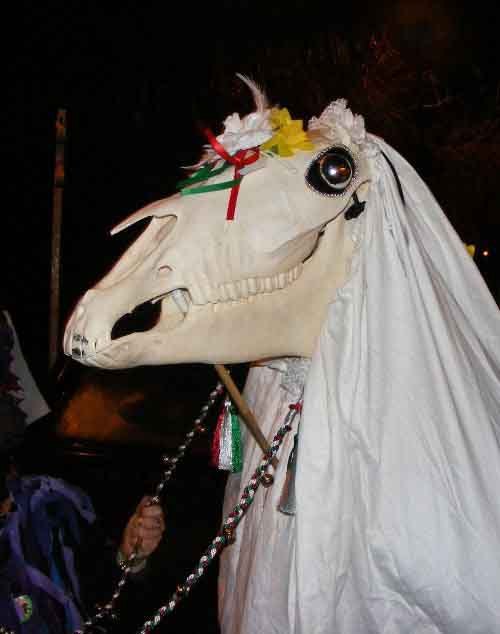
28. does your country have a lot of lakes, mountains, rivers? do you have favourites?
oh boy! it does indeed... if you wanna know how many mountains wales has, it's better to just look at this topography map
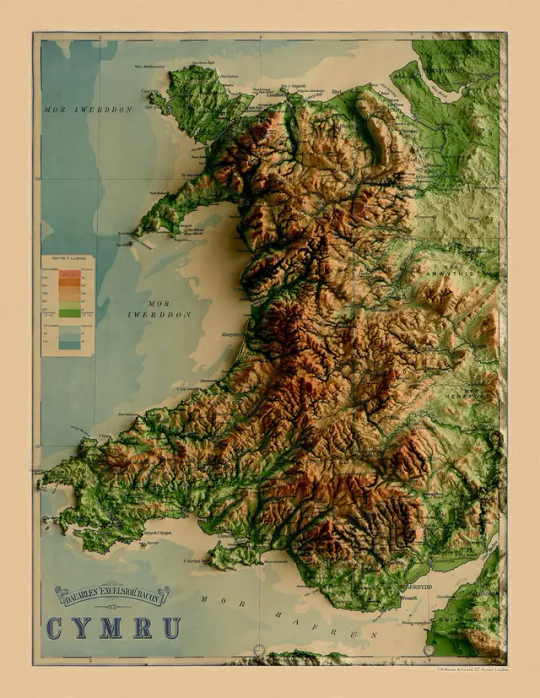
there aren't any genuinely flat areas of wales. my high school was near the top of a mountain, and my house growing up was halfway up the same one. we hated having to walk up it every morning, and yet, we still went down to the village on our lunch hour. maybe that's why we were all fucking tiny bc we trekked up a mountain twice a day.
here's one of our rivers, which we similarly have a fuck ton of
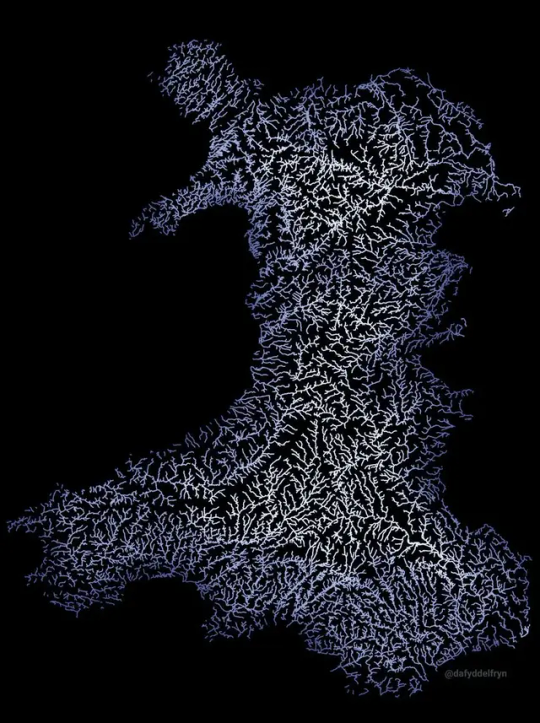
so yeah. a shit ton of rivers and a shit ton of mountains. my favourite mountains are the brecon beacons bc we used to go there so much when i was growing up. it's like a tradition for welsh people to climb there and hike there as soon as the weather gets milder!
oh wow, sorry this was SOOOO long but it was fun to talk about these things so thank you for asking!!
for this ask game!
7 notes
·
View notes
Text
卜算子·我住长江头 - Song of Divination · I live at the Long River’s head
by 李之仪 (Li Zhiyi, 1048 to 1117)
我住长江头 君住长江尾
wǒ zhù chángjiāng tóu, jūn zhù chángjiāng wěi
I live at the Long River’s head, you live at the Long River’s tail end.
日日思君不见君 共饮长江水
rì rì sī jūn bùjiàn jūn, gòng yǐn chángjiāng shuǐ
Day after day, missing you but not seeing you, together, in the Long River’s water we partake.
此水几时休 此恨何时已
cǐ shuǐ jǐ shí xiū, cǐ hèn hé shí yǐ
The time when the water’s flow ceases is when resentment for this passes.
只愿君心似我心 定不负相思意
Zhǐ yuàn jūn xīn sì wǒ xīn, dìng bù fù xiāng sī yì
May your heart be as mine. The love from which this longing springs shall not be in vain.
………………………………………………………………………………………….
Notes
TITLE
The tune pattern for this song is卜算子, commonly translated as Song of Divination. The character卜 (bǔ) is a pictogram often explained as a representation of the cracks that appear on scorched tortoise shells, one of the methods of ancient Chinese divination. And to 算 (suàn), to calculate, is of course another method of divination. There are some different opinions of what this tune pattern is named for. Some say that 子 does not refer to a person, and instead is short for 曲子 - a little song, some say it’s named for ‘a person who does divinations’. Undeniably, there is divination in the name, and a ci is a song. So that’s what I went with!
There are several famous songs with this tune pattern, by Su Shi / Su Dongpo and by Lu You (we should know him quite well by now), of which I would say Li Zhiyi’s might be the most simple yet deeply romantic. This is probably why it’s super famous… that and the fact that it’s in the 300 Song Lyric collection.
// random thought re: 300 Tang Poems, 300 Song Lyrics, 300 Yuan Songs, maybe they were all collected into these anthologies of 300+ works because the Classic of Poetry was originally called 300 Poems?
I love Su Shi’s song for it’s stubborn loneliness in the cold and also its calm. But Lu You’s is just !!!!!!!!!! makes me want to curl around it like a loving cat. Thinking about them both makes me want to share them too!!!
Some other day perhaps.
These are so famous I had no idea they were all using the same tune pattern - and I can’t explain how this one works because Song lyric tune patterns are still a mystery to me. Will share if I ever figure it out, but yeah… I’m nowhere near that point now ahahah.
BACKGROUND
Li Zhiyi, courtesy name - Duanshu, was a poet of the Northern Song Dynasty and an important member of the Su Dongpo circle.
(My man Su Shi was very popular and very beloved in his time with many students and even more admirers, we have talked about how he made friends wherever he gets exiled, how he has a good sense of humor and makes fun of himself too).
Born in 1048 and later becoming a student of Fan Chunren, son of Fan Zhongyan (also a very cool dude! He writes amazing things /cough不以物喜不以己悲cough/, so let’s talk about him someday ~) and passed the imperial exams to become a jinshi in the year 1070 at the age of 22.
Sixteen years later in 1086, Fan Chunren effectively became the prime minister while Li Zhiyi became a scribe at a military division for the central government, and then magistrate for Yuan Prefacture not long after. It was after this time that he began interacting frequently with Su Shi, Huang Tingjian and others from that clique. Li Zhiyi also worked for Su Shi in his Governer’s Office while he was the Governor for Ding Prefecture.
(From Su Shi’s Baidu entry: In 1093, Empress Dowager Gao passed away, so Emperor Zhezong was in power and the new faction rose in prominence again. Su Shi was eventually relegated far from the capital to Hui Province in 1094, and then Hainan Island in 1097.)
And so, in 1099, when Li Zhiyi was promoted to supervisor for the vault for incense herbs - a subdivision under the Minister of Revenue, he was censured for once working for Su Shi and suspended from his position. Unfortunately for him, at some point afterwards, he was recommended for the position of Envoy for Hedong (here’s an interesting article in Chinese on the position of Envoy), but struck from the list when he offended the new prime minister in 1101 with an epitaph for Fan Zhongyan, the use of which was disallowed, and was exiled for a time. At least that’s what I’m interpreting from 东都事略, Summary of Events in the Eastern Capital, a book chronicling Northern Song dynasty (960–1126) history, written by Wang Cheng, a Southern Song official in the historiographic compilation bureau.
He was then posted with his family to Taiping Province, where he stayed for four years. In his own words as referenced from 姑溪居士文集, Collected Works of Guxi Hermit, Volume 1 Chapter 21: In the first year, his son and daughter in law left this world, in the second, he fell ill, Spring and Summer passed like trudging through water and he was doing very poorly, in the third year, his wife died too. In the beginning of the fourth year, he suffered from a skin disease and other conditions.
From 挥麈录 Records of a Horsetail Wisk by Wang Mingqing, a court official of the Southern Song Dynasty, Chapter 6, it seems Li Zhiyi was eventually reinstated as a court official after he was granted amnesty. Cross referencing with events in Emperor Huizhong of Song's rule (he was half-brother of Emperor Zhezong and succeeded the throne after his brother’s death in 1100), it seems that in 1107, there was to be a change of Era Name in the next year and the Emperor had offered sacrifices to the Jade Emperor, Haotian Shangdi (the highest deity in Daoism and Chinese religion from Tang Dynasty onwards); a general amnesty was granted to all as well. But Li Zhiyi did not return to his post, and instead remained in Taiping Prefecture. And this is where someone new and important enters the picture.
Backtracking five years to 1102, Yang Shu (杨姝) was a courtesan of Taiping Prefecture at this time. We know more about her because Huang Tingjian, courtesy name Luzhi, the well known calligrapher, artist, scholar, government official, and poet of Song Dynasty (mentioned earlier as being close to Su Shi, just in case you forgot), wrote her several poems while he was Prefect there for nine days in 1102.
Who else was in Taiping Prefecture in 1102? That’s right! Our friend Li Zhiyi.
They played a little poetry writing game, the results of which were recorded in his Collected Works of Guxi Hermit, Chapter 47 as well: 好事近 · 与黄鲁直于当涂花园石洞听杨妹弹履霜操鲁直有词因次韵, (To the tune of) Good Tidings Approach · With Luzhi at Dangtu Garden’s Stone Cave Listening to Yang Shu Pluck Treading in the Frost, Luzhi has lyrics for doing a ciyun. This ciyun just involves writing lyrics according to the rhyme pattern of the original lyric; usually one person writes the first and then another composes a reply in the same pattern. In this case, Huang Tingjian went first, and Li Zhiyi followed. (Let me know if you’d like to see what they wrote!)
During that same period, or perhaps thinking of this day some time after, Li Zhiyi wrote her two more poems to the tune of popular songs. Huang Tingjian wrote one for her as well, calling her a ‘little singer’ in the short prelude to his lyric 好事近, 太平州小妓杨姝弹琴送酒, (To the tune of) Good Tidings Approach, Taiping Prefecture’s Little Singer Yang Shu Plays the Qin and Brings Wine.
And again, from Records of a Horsetail Wisk, we learn that Li Zhiyi, childless and widowed, remarried Yang Shu and brought her home. He was in his late fifties, probably nearing his sixties by this point, and she was his junior by many decades. Miraculously, they had a child together. But it was also this union that was the soft target for trouble to be brought upon them some ten years later - Guo Xiangzheng (郭祥正) who was an enemy of Li Zhiyi had someone accuse their family of falsifying the parentage of this child, such that he could be conferred privileges. (And I assume this is because Li Zhiyi is technically still a court official? If it was something else, I’m unable to track it down…) For the second or third time - I’ve lost count - Li Zhiyi’s name was struck from the court’s records and Yang Shu was sentenced to caning.
We have a poem from the delighted Guo Xiangzheng to learn of the aftermath:
七十馀岁老朝郎 | Seventy and more, the old court official,
曾向元祐说文章 | in Yuanyou era, essays he did compose.
如今白首归田后 | Now white-haired and retired,
却与杨姝洗杖疮 | instead, he washes Yang Shu’s cane welts.
…bro… :/
Yes, we know they were wronged because Li Zhiyi’s nephew and student eventually helped overturn the case and reveal the truth. The text says ‘wife and child were returned to him’, so I imagine they were either jailed for the ‘fraud’ or returned to Yang Shu’s original class and separated from Li Zhiyi. Again, his official status was restored to him and in addition, the post of Grand Master for Court Discussion, but he declined this in favour of his retirement life.
After so much reading, I am still not able to pinpoint a year in which卜算子·我住长江头 was written. Only a general time period of ‘much later in life’ and possibly after having met Yang Shu simply from its place in his Collected Works of Guxi Hermit, Chapter 45. What seems to be certain though, is that it is written for her, and I am glad to hear however indirectly that these feelings were sincere.
Only in the fiercest fire, do you know what’s real gold and all that…
POEM
I would never have guessed that these words were from an old man, because they’re so bright, the emotions so fiery and all the more so for their simplicity.
There is drama in that hyperbole of distance. The Long River is 6300 km long. But how unreachable and impossible is the distance between them, is also how they are connected. Like how we might look up at the sky when a loved one is far away and take comfort in the fact that that they are under the same sky, or looking up at the same moon. Feelings are ‘entrusted’ to a moon, the stars, a river.
I feel like making or forcing this connection figuratively or via physical action of drinking the water from the same river, is absurdly childish yet charming. ‘思君不见君’ Thinking of you but not seeing you is a common lament, and then… here’s something that’s (not) going to make you feel better!
How Not Better are we?
Well... how likely is the Long River to cease its flow?
The resentment springs infinitely like water from the river’s source, what is the source of the resentment though - that’s love. Hence, this love will stop when the roaring river stops: never.
And the thing to remember, at least from how I read this poem, is that it’s one sided. ‘只愿君心似我心’ I only wish that your heart is as mine. He doesn’t know, but he knows. The second part of this line is not a condition but a promise, a statement of fact emphasized beautifully in that 定 ‘for sure’.

Source
#李之仪#卜算子#卜算子·我住长江头#poems#northern song dynasty#you DO not want to know how long i was stuck reading for this#and how much i ommitted#LMAO#so so so many kudos to the meticulous souls who put together timelines of these people's lives on wiki#baidu and all#i really appreciate it#AND CTEXT PROJECT#AND WIKI TOO#oh my god it's so amazing#lifesaving#and to mr c for 断句ing for me when i couldn't read anymore lmao#commentary
41 notes
·
View notes
Text
@scharlakol & @sacaeblade sent:
18. A memory they’d love to change tosses a grenade before you can get me
//sacae wants me dead forreal

//via memories; no longer accepting
Daisies to say 'I love you'
Carnations for an ache
Lilies are a virtue
And Bellflowers mean 'I'll see you when I wake'
Sain breathes deep. Every flower in his arrangement is accounted for, each of their petaled heads touched by the tip of his finger. He's been rummaging through the bouquet for the better half of an hour now, ensuring that every last detail is perfect--is picturesque. This would be the climactic scene at the end of his act. He'd finally roll up his sleeve and allow his lady to see the heart he wears underneath, speaking truly and honestly when he professes his love.
He knows what he is. That he's very rarely taken seriously. But dash your head against a rock enough times, and it may just start to crack; maybe this time she'll understand. Maybe this time she'll see.
He cradles the flowers like they're a newborn, saddling onto his mount with measured motions. Like treading upon a carpet of gossamer, he is careful. Not even the wind can be allowed to misarrange that which he has painstakingly crafted.
He rides.
And as he draws near, she comes into view. She is the very picture of beauty, just as lovely and refined as their first encounter. Her hair is warm and gentle, like a breeze, but her eyes are each wells of insurmountable strength. They are perfect compliments to one another: the sun's first ray on a field of morning frost. Nothing is too cold, and nothing too hot. Everything attains balance and moderation by another of her qualities. And when he sees her move, he finds it difficult to look away. Every motion, every flick of the blade, is deliberate and practiced. She flows faster and more poised than any river: a movement Sain wishes would end up in his arms. To see her dance across and open field and end in his hand, he could die happy. Every effort spared for her would have been made more than worthwhile, such that the remainder of his life's breaths could all be hers to claim. He wants her. He needs her. In the way a sunflower turns to the sky, aching for its one true love.
And right now, she's... Speaking with the others.
And she looks happy.
Sain stops himself. He laughs a little, noticing how easily she does the same. Except, he doesn't think he's ever heard her laugh. Not while he was around, at least. 'It seems there are no decent men among Lycia's knights,' she had once said. And though it failed to reach him then, the realization that he has more than just his own reputation to tarnish takes root. There is Kent, too, and Lord Wallace. And his father, who he fears a slight against more than any other. Is it right for him to be doing this? The Lance sucks in a breath. His gaze falls from Lyndis and the others, and onto his bouquet. It seems... Pathetic. Insufferable. Like it would only earn further scorn against his house and knightly order. "They... Don't deserve that," he mutters, looking back to his liege to see that she has still not noticed him.
"There's still time to go back."
If asked about why he had spoken those words, Sain could not come up with an answer. They sort of just fell out of his mouth, far beyond the reach of his own control. And as they do, his vision grows bleak. The world dons a deeper shade of gray--reflected in his eyes by the loss of focus in their lenses. Nothing seems worthwhile. Not the flowers, not the sappy poem to go along with them--not even his service, in a way. But the shake of his head dispels that last thought. Sain may be able to convince himself that Lyndis will never accept him as her man, but he will always be her knight. He chews on the inside of his cheek. Hands tremble as they reach for his horse's reins, but once they're grabbed, he yanks them back.
The flowers fall from his hands, destroyed in an instant by the trampling of hooves. Daisies are torn, petal from petal, and half-ground into a medicinal sludge. Carnations, with their crimson buds, look like a stain of blood against the side of the road. Lilies lose their virtue, becoming nothing more than a sinner's discarded hope as their purity is dyed brown with dust. And Bellflowers, whose shape had been so pronounced and well-kept, are flattened. Naught remains but tattered heads and splintered stems.
Sain has whipped his mount into a full sprint, making the choice to venture back into town and keep his secret safe in his heart. The arms of a village maiden, though transient, will soothe his hurt feelings for a short while.
"It won't hurt anyone this way. Not me, not them..."
#IC#ASKBOX#SCHARLAKOL#SACAEBLADE#DRABBLE#//timeline-wise this would be sometime during lyn mode#//aka before he could reasonably unlock any support convos#//and would thus influence his decision to NOT have a support chain with lyn#//because deliberately avoiding her is the only possible way i could explain not having one
12 notes
·
View notes
Text
finished yangtze river dolphin episode from extraordinary attorney woo and i think im near tears. i love this episode so much. a huge chunk of my media experience keeps telling me to be on edge, telling me that things are going to get dirty and dramatic and people are going to get antagonised for the sake of a good show, but it never goes there. the witness (? is that what you call them for civil cases?) temporarily snapping in court because everyone from the company is tired about the lawsuit, but after the court hearing ends, the plaintiffs end up hugging her and reassuring her that "it's okay, people have their own opinions, you're not a bad person, this is just how circumstances are and i wouldn't fault you for not picking the ‘moral high road’ for the sake of your own stability and comfort. i would've made the same decision in your shoes. these things shouldn't be blamed on you, but the way our patriarchal society has been set up even before we were born that forces us to choose between these two things. we will never fault you for not making the impossible perfect choice. no matter what happens in the end, we will never fault you for it."
and i'm just like. crying man. it's easy in shows involving law to easily spin a tale to villainise characters the main characters are disagreeing with, but like... this show goes beyond that and reveals something very simple and true, which is that humans are flawed, which means they can make flawed decisions, but that is not always a failure of morality or conscience.
and my god the critique of the mir life company was so good too. even when i thought i'd hate the hr guy, it turns out he's also just another cog in the machine they'd throw out. he's also been fed the same lies and sweet promises the others were, and i couldn't feel that familiar sense of "vindication!!!" i felt when villains got what they deserved. because it reminded me, once again, that he's not a villain; he's just another guy crushed under the weight of his imperfect decisions, becoming the scapegoat for all the targeted animosity when in reality he was discarded just as easily. it felt like his appearance was deliberately put so we'd have someone's face to hate, to throw the eggs on, but in reality the shitty choices are always made from people higher up than him, invisible and faceless but very much present in influencing the quality of thousands of people's livelihoods.
god. what a good show. between young-woo and su-yeon's friendship, i'm also loving the women solidarity in this episode. i love it so much. AND DON'T EVEN GET ME STARTED ON RYU JAE-SOOK AND HER PHILOSOPHY ABOUT BEING AN ATTORNEY AND HER POEM SHE READ ON THE ROOFTOP. I'LL BURST INTO TEARS IF I REMEMBER IT
#yuu rambles#extraordinary attorney woo#im so. im SOOOOOOO. ougjrhfkfhfjhfj#please watch this show i love it so much. im so weepy about how human everyone is#its like. it reminds me of glass onion / knives out in the sense that its a very kind show#you think its going to pull the disappointing tricks other shows/movies in its genre have pulled#and you brace yourself for the hit and the cringe but it never comes.#it just gently puts a hand on your shoulder and reminds you that yes life is often complicated with politics drama and betrayal#but the truth can be this simple and true. and people don't need to be villains to make monstrous mistakes#and yet we must all persevere and remember to keep in mind the bigger picture and the true goal in order to avoid#making enemies out of potential allies#god. GOD........
4 notes
·
View notes
Text
happy gushiwensday FRIDAY let’s have a big fat poem from the gothmaster supreme, Li He!! It’s called The Song of the Departure of the Gold and Bronze Immortal.
the autumn wind brings young liu to the flourishing tomb.
night hears his horse whinny but at dawn there's no trace of footprints.
he drew balconies around the hanging osmanthus, the scent of autumn---
thirty-six palaces now overgrown with jade-green moss.
a wei official escorts the carriage a thousand long miles
through the eastern pass where a sour wind rushes into their eyes.
the sky leaves room for the Han moon rising over the palace gate;
the clear memory of the emperor brings on tears like liquid lead.
fading orchids in white see off guests along the chang'an road---
if heaven cared at all it would be long grown old by now.
he leaves alone with the plate of dew under a desolate moon.
chang'an grows distant and the river's voice small.
LOTS of notes under the cut this time.
《金铜仙人辞汉歌》
茂陵刘郎秋风客,夜闻马嘶晓无迹。
画栏桂树悬秋香,三十六宫土花碧。
魏官牵车指千里,东关酸风射眸子。
空将汉月出宫门,忆君清泪如铅水。
衰兰送客咸阳道,天若有情天亦老。
携盘独出月荒凉,渭城已远波声小。
So normally we don’t have time for all that much research, and there’s some REALLY good stuff---I wanted to write up some of what Laurence found. To appreciate how bonkers this poem is it requires a little background, some of which the poet himself provides in his foreword. Li He writes near the end of the Tang Dynasty---he KNOWS the end of the Tang Dynasty is near---about events during the Wei Dynasty, where Emperor Ming orders a statue to be removed from his palace and driven elsewhere. The statue, the eponymous immortal, is of Emperor Wu of the Han Dynasty. So we have three layers of history in addition to the one where we’re reading it. Now let’s see some translation notes!
young liu --- Liu-lang is a staggeringly informal way to address Liu Che, Emperor Wu of Han. The tomb is his tomb, which he started constructing at age 16 according to Laurence’s researches; he’s already preparing to be buried. At this place his life and death, his past and future, are condensed to a single point. The flourishing tomb. In the next line we’ll see just how ephemeral he is.
he drew balconies --- here it says 画栏, “draw/paint railing.” They could be brightly colored painted railings to contrast the decay evident in the next line, but I liked it as another of Liu-lang’s big plans that’s eventually been overtaken by the weight of time.
a wei official --- now we’ve had our little flashback, the statue is leaving in a carriage, escorted by an official of the Wei Dynasty.
the sky leaves room --- some fascinating word choices in this line! This phrase is 空将, “sky/emptiness leads/invites.” Normally when you see 空 you’re on alert for Buddhist Connotations, but in this case I think Mr Li has a different reason for using it. Anyway, because of the word choice I kind of imagined the sky as a stage, and the moon as the player who’s about to step out.
the han moon --- according to Laurence, this is a phrase coined during the Three Kingdoms period (which broke up the Han Dynasty and was immediately followed by the Wei Dynasty!) to evoke the nostalgia of the undivided empire (Laurence’s words). And people would just call the moon that.
tears like liquid lead --- Baike claims that this means the tears and the heart that cried them are heavy, but molten lead also has the important characteristic of being hot enough to burn. The other interesting thing here is, who would cry metal tears? Why not a metal statue? I like the idea of the statue crying as it remembers the person it represents but isn’t identical with. Either way, the Han moon and the Han Emperor are practically one and the same here.
fading orchids in white --- 衰 is delicious because it can mean both declining/waning and mourning clothes depending on how you choose to pronounce it. So yes, the flowers of summer are withering because it’s autumn, but mortal lives are also withering---maybe they’re seeing people off from this life? I don’t know enough about whether funeral processions are a thing.
the chang’an road --- it actually says Xianyang road, but for clarity I’ve replaced the name of the road with the name of the place the road is in.
if heaven cared at all it would be long grown old by now --- a SUPER interesting line, and one much-cribbed. Literally reads something like “heaven like have emotions, heaven also old.” Here 天 stands in direct contrast to 空 from a couple lines ago. They’re both the sky, but 天 is also Heaven, the dispassionate arbiter of mortal fates. So we think Heaven is also being contrasted to the mortal orchids---they wither because they care. Feeling emotion is what kills us, and lacking it makes you immortal. Heaven is, of course, also the only dynasty that will not eventually fall. I couldn’t help thinking about that post about apocalyptic prophecies as an assurance that no empire lasts forever except Heaven’s. Li He looks into the past and predicts the imminent future of his own Tang Dynasty.
plate of dew --- a plate held by the statue, which is explained in the foreword. I believe it’s for holding dew from the clouds, which has some kind of valence of conferring immortality. So here it almost feels like the statue is the one who got up and walked out of the Wei palace of its own volition.
a desolate moon --- by way of contrast to the Han moon?
chang’an grows distant --- it actually says Wei City here, referring to the city on the Wei River (different spelling than the dynasty). But this is an interesting way to refer to the capital! Poets seem to hate calling Chang’an by its actual name (maybe all cities?) and it has quite the flourishing collection of epithets. Here the city is defined by the river, not by any human activities that take place there. The river will still be there when every earthly dynasty has fallen and Heaven is the only thing left to look down on it.
10 notes
·
View notes
Text
A BLUE ROAD IN THE NIGHT
Voyage in the blue night
Some years ago, never mind how many exactly, I had a really good thing going with painting, writing and research. A Gallery in Kurobe, a small city up the coast from Toyama where I live, was planning an exhibition around a poet — Fuyuji Tanaka (1894-1980) who lived in and wrote about Kurobe. Somehow the curator had heard of my painting and asked me to contribute something — she gave me a small brown book of his poems in Japanese of which I could understand absolutely nothing, I carried it around asking my wife, her friends, strangers and once some teenagers in an English lesson 1 to translate bits of just give me the gist of random pages. On the internet I found some works translated, here are seven poems from Poetry magazine and a very helpful end notes explanation of the figure in the first poem


I tried to read about Japan at that time, poetry magazines and movements, about Kurobe and this region, Hokuriku. It was a great time for printing stuff out at work and then reading it on the train, all the poetry groups and their magazines reminded me of Bolano novels, but it wasn’t very clear to me how to make some paintings yet

Luckily the curator, Mariko, started to translate the poems in book for me, like the one above, and i started to get a sense of the book and his work. I made lists of nouns and other lists of plants and birds, these translations were immensely helpful. I printed them all off at work and carried around a folder and read and write a bit in between my day job or in the evening. Then a few times when I had a free day I would take the train to one of the stations in Kurobe and take a long walk up towards the mountains through the rice fields, past old houses and huge new supermarkets and then following one of the rivers back towards the sea. I took a lot of photos, the ground was all brown and green and red and rusty, people were making fires and drying out vegetables. I picked up stones and listened to a little music or to some podcasts about the news and the faff of the world then.
My memory of that time was that it was suddenly slightly hopeful that something actually good could happen in politics, in the very narrow sliver of the world I read about regularly, something might change 2.

Life out of balance
This was all in the autumn, I was anxious to visit Kurobe as often as I could before the snow came, but that was the only winter anyone can remember where it didn’t snow in this region of Japan, in January the trees were bare and grass was all yellow and brown and strange — it seemed pretty sad to think about what Fuyuji san would have made of it, the regular order of small things happening throughout the year being such a constant in his poems. Koyaanisqatsi I thought to myself, a word I can think but not say or spell, I know it means life out of balance though, for some reason it was one of a few videos I was allowed to watch as a child.
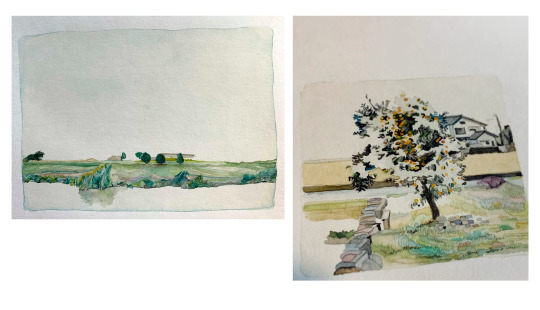
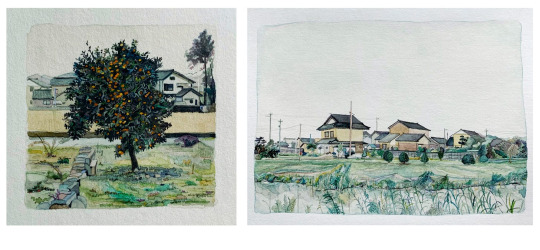
If you want to remember you better write down the names
One night while searching online I found a reference to a James Kirkup translating some of Fuyuji’s poems, I think in a book called Burning Giraffes, I spent a long time trying to find a pdf and failing, James Kirkup seemed a really interesting person, Id still like to read his books on Japan especially.
Another poet who I read about was Mitsuharu Kaneko who wrote something called the shark or sinking shark, a political attack on the government of the late 1920s in Japan. Every once in a while Id get some more pages of translations of poems from Mariko and Id read a bit more and do some paintings.
I made quite a lot of paintings that were part of that group of work. Somewhere near the end I saw people on twitter talking about a new very long Bob Dylan song about the JFK assassination, something I couldn’t believe was actually real and then once I heard it I couldn’t believe how much I loved it. I listened to it on the seafront after taking all the work to gallery and seeing the beautiful art Yukako Kashiwai and Satoshi Oka — The two other artists in the show. That was around the time the schools all closed suddenly and Corona was all over the news, there was a few months delay and then the show opened in the spring, everything was totally different in Kurobe, wild colors in the gardens and on the water, birds were everywhere.
That spring came late — but it comes all together at once — becomes lively

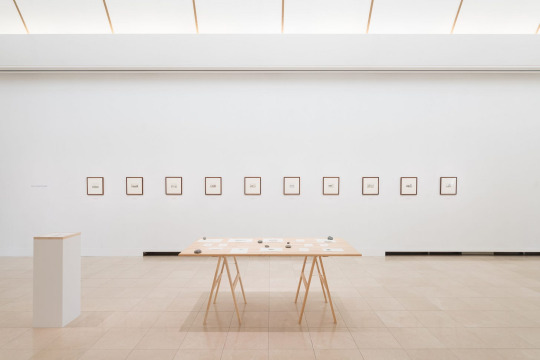
1
it was a really good time in fact, they both knew quiet a lot about Japanese poetry of different periods and we tried translating some famous haikus in different ways.
2
a year or so before this, in the summer while cherries were being sold in the super markets here, I cycled to a kindergarten listening to the BBC News live as the election results were called in the UK, ultimately Jeremy corbyns labour party didn’t form a government but for a few days and that afternoon especially it seemed very close to being real.
#writing#tanakafuyuji#smallpaintings#kurobe#artonpaper#japan#poetry#art#artists on tumblr#watercolourart#watercolourpainting#tanaka fuyuji#fuyuji#bob dylan#murdermostfoul#toyama#aaronjosephsewards
8 notes
·
View notes
Note
For the non-american ask set...
All of them pls >:)
Suffer <3
hold on- I fell asleep
uh
not gonna give too many explanations cuz that would take WAAAY too long
so
1. dripstone cave of Aggtelek
2. if by holidays the list meant like Christmas, then at home, if it meant summer break then I'm okay with whatever
3. nope, it did before 1920 but not anymore
4. Gulash soup
5. almost any/every older song, like "Petroleum lámpa"
6. I don't really like newer songs, they make me feel weird in a bad way
7. Megszentségteleníthetetlenkedéseitekért, (uhhhh ←stopped remembering words) lángos, cinege
8. not really, or at least never happened
9. haven't been to too many but Romania (more specifically Transylvania) is pretty cool and I guess I know about I a little more than other neighbouring countries
10. well that's though.. I don't swear soo uhh.. giving you a fun one that has no actual swear words hehe: Hogy a villamos szabja rád a rövidnadrágot!
11. uhhh... I don't have one... so I'll just.. got with basic answer of Sándor Petöfi
12. never seen any, the only time I encounter poems is in literature class
13. Name day, definitely name days. also pulling each others ears when it's their name day or their birthday (that one is only done in my family I think)
14. I think older cartoons were pretty good, don't think there's any new made here actually
15. the "lopásvédő törölköző" when on a beach is the main thing we can recognize each other in neighbouring countries lol
16. apparently people think we ride horses everywhere (???) which is just plain stupid and not true (multiple sources said this stereotype) — I do somewhat agree with us liking to drink. Like if someone is here as a guest for longer than an hour (and we rarely see the person) you can bet your life on someone asking them if they want some Pálinka
17. eh.. not really. I guess maybe like the very begging of it. Like how we got here and all
18. lol yeah. There's even a wikipedia article on the dialect. (szigetköz dialect)
19. I think it's fine, I mean... I may or may not had my room painted red, white and green for a while so I got no say in this... The emblem is near and I only hate the national anthem because I had to memorize the whole thing for class in middle school
20. I'm pretty sure either it's soccer or basketball
21. hmmm... túró rudi and Pálinka I guess
22. that our language is still alive somehow?? Like damn. I am ashamed of the fact that we're incredibly hateful and stubborn
23. Pálinka, next question
24. we hate on Belgium but that's a collective European thing. So I'd say uhh neighbouring countries..? + Russia perhaps..???
25. nah, in the end of the day I like it here
26. Fun fact! many times they shoot parts of movies here because it's way cheaper than others, yet architecturely it's still pretty nice I guess. It's always fun when parts of Budapest is in big movies lol
27. I don't have any
28. a near by city is literally dubbed as the "the city of rivers" so I guess. There's two major lakes but you can only go swim in lake Balaton (and lots of smaller lakes scattered all around). There are some mountains, but there are more plains than them. No favorite place
29. Not to my knowledge, no
30. from my moms mom side German, from her (my moms) dad's side Székely (no clue of the eng translation). And from my dads side, only guessing by our surname, we probably have ancestry from Slavic people (not sure if this is what the question was asking..
anyways, this took waaay too long and I'm not built for knowing stuff about this wretched place
(had to edit, forgot the 20th question)
1 note
·
View note
Text
I like how unbothered you are of everything; Like the world could be falling apart and you would go out for a walk, bring a pastry on your way back and watch it fall apart without a complaint.
Your laptop has ink stains from the leaking pen you left on top with paper and unused diaries and books all clamped together, Your nails have ripped map-shaped nail paint on them, and your shelf has a leaning tower of books and bottles and everything that could be pushed in -all hanging by hope much like your life so close to falling yet not fallen, Your assignments barely make it to the deadline with slanting margins and questionable handwriting, You keep your head on anything that is elevated enough but can't compromise with a pillow that you have to hug and sleep, you use the same notebook for years which managed to survive bcs u never took it out, It's still almost as new with a few pages that start with words and end with scribbles.
Your wardrobe has clothes with lines from random folds and scents from years ago, You toss from one side of the bed to another while trying to sleep, like your mother would toss the flattened dough on a flame while making chapatis for dinner you once dreaded but now crave.There are wrappers under your bed, empty soft drink bottles near your head,there is dust on the corners of your bed but you still return to it.
Your hands are dirty, your heart is clean, your hands can swim, and your heart is drowning. You would eat anything without a complaint as long as you like the one you're eating with and is veg, your phone is filled with bad selfies of days you were practically dying and there's always a notification of storage space running out whenever you use your phone, you always forget to carry a pen and when you have one, they usually don't work. you keep wrappers on the moving bus in the side pocket of your bag but forget to empty that pocket now it's filled to the top. Your phone has scratch marks and it's high time you should change it but you just don't feel like it. One side of your headphones has stopped working but you still use it but you keep on forgetting to order new. You can't take care of yourself but you have learned to navigate the mess rightly,
You keep on losing keys, mobile, pens, and love and turn your room upside down to find them, You have never had one day in your life when you were able to find a pair of socks before going out, Your feet mostly have splinters, you miss breakfast like you have a rivalry with food, and you mostly cry on your birthday; you can't take care of yourself, but it's astonishing how much you care about little things that make you like the white rose gifted to you has now turned brown, your poems brim with events camera never captured, you didn't lose that one ring you never took off since you were in seventh, you return to archives just to see them smile with you, you love planning for birthdays, you buy flowers for love, you cook for them, and you even buy gift wrap to cover the gift, you'll say yes to eating momos even though it isn't your favorite thing, your phone is running out of storage but you would still fill that up with failed attempts of capturing the moon, snaps of the sky that looks pretty every day, kittens of your pg, a random bird busy with its usuals. anything with water, tears, or river.
You care about things that have even a touch of love and I think that's enough till you learn to love yourself.
1 note
·
View note
Text
“Classics for the people – why we should all learn from the ancient Greeks
The dazzling thought-world of the Greeks gave us our ideas of democracy and happiness. Yet learning classics tends to be restricted to the privileged few. It’s time for ‘elitist dinosaurs’ to embrace a citizens’ classics for all

Lessons in liberty … ancient Greece produced ideas that have subsequently informed the most significant moments in western political history. Illustration by Romy Blumel for the Saturday Review
Edith Hall
Sat 20 Jun 2015 08.00 BST
Just how special were the ancient Greeks? Was there really a Greek “miracle”? The question has become painfully politicised. Critics of colonialism and racism tend to play down the specialness of the ancient Greeks. Those who maintain that there was something identifiably different and even superior about the Greeks, on the other hand, are often die-hard conservatives who have a vested interest in proving the superiority of “western” ideals. I fit into neither camp. I am certainly opposed to colonialism and racism, and have investigated reactionary abuses of the classical tradition in colonial India and by apologists of slavery all the way through to the American Civil War. But my constant engagement with the ancient Greeks and their culture has made me more, rather than less, convinced that they asked a series of crucial questions that are difficult to identify in combination within any of the other cultures of the ancient Mediterranean or Near Eastern antiquity. This is why, as I will go on to argue, I believe in classics for the people – that ideas from the ancient Greeks should be taught to everybody, not just the privileged few.
The foundations of Greek culture were laid long before the arrival of Christianity, between 800 and 300BC. Greek-speakers lived in hundreds of different villages, towns and cities, from Spain to Libya and the Nile Delta, from the freezing river Don in the northeastern corner of the Black Sea to Trebizond. They were culturally elastic, and often freely intermarried with other peoples; they had no sense of ethnic inequality that was biologically determined, since the concepts of distinct world “races” had not been invented. They tolerated and even welcomed imported foreign gods. And what united them was never geopolitics. With the arguable exception of the short-lived Macedonian empire in the later 4th century BC, there never was a recognisable, independent, state run by Greek-speakers, centred in and including what we now know as Greece, until after the Greek war of independence in the early 19th century.
What bound the Greeks together was an enquiring cast of mind underpinned by a wonderful shared set of stories and poems and a restlessness that made them more likely to sail away and found a new city-state than tolerate starvation or oppression in a mainland metropolis. The diasporic, seafaring Greeks, while they invented new communities from scratch and were stimulated by interacting with other ethnic groups, made a rapid series of intellectual discoveries that raised the Mediterranean world to a new level of civilisation. This process of self-education was much admired by the Greeks and Romans of the centuries that followed. When the texts and artworks of classical Greece were rediscovered in the European Renaissance, they changed the world for a second time.

The Education of Achilles by Chiron fresco from Herculaneum. Photograph: Leemage/Corbis
Yet over the last two decades the notion that the Greeks were exceptional has been questioned. It has been emphasised that they were just one of many ethnic and linguistic groups centred in the eastern end of the ancient Mediterranean world. Long before the Greeks appeared in the historical record, several complicated civilisations had existed – the Mesopotamians and Egyptians, the Hattians and Hittites. Other peoples provided the Greeks with crucial technological advances; they learned the phonetic alphabet from the Phoenicians, and how to mint coins from the Lydians. They may have learned how to compose elaborate cult hymns from the mysterious Luwians of Syria and central Anatolia. During the period in which the Greeks invented rational philosophy and science, after 600BC, their horizons were dramatically opened up by the expansion of the Persian empire.
In the late 19th and 20th centuries, our understanding of the other cultures of the Ancient Near East advanced rapidly. We know far more about the minds of the Greeks’ predecessors and neighbours than we did before the landmark discovery of the Epic of Gilgamesh on clay tablets in the Tigris valley in 1853. There has been a stream of newly published texts in the languages of the successive peoples who dominated the fertile plains of Mesopotamia (Sumerians, Akkadians, Babylonians, Assyrians). The words of Hittites on the tablets found at Hattuša in central Turkey and the phrases inscribed on clay tablets at Ugarit in northern Syria have been deciphered. New texts as well as fresh interpretations of writings by the ancient Egyptians continue to appear, requiring, for example, a reassessment of the importance of the Nubians to North African history. Many of these thrilling advances have revealed how much the Greeks shared with, and absorbed from, their predecessors and neighbours. Painstaking comparative studies have been published which reveal the Greek “miracle” to have been one constituent of a continuous process of intercultural exchange.

Erechtheion, an ancient greek temple in Athens. Photograph: Alamy
It has become a new orthodoxy that the Greeks were very similar to their Ancient Near Eastern neighbours, in Mesopotamia, Egypt, the Levant, Persia and Asia Minor. Some scholars have gone so far as to ask whether the Greeks came up with anything new at all, or whether they merely acted as a conduit through which the combined wisdom of all the civilisations of the eastern Mediterranean was disseminated across the territories conquered by Alexander the Great, before arriving at Rome and posterity. Others have seen sinister racist motives at work and accused classicists of creating in their own image the Oldest Dead White European Males; some have claimed, with some justification, that northern Europeans have systematically distorted and concealed the evidence showing how much the ancient Greeks owed to Semitic and African peoples rather than to Indo-European, “Aryan” traditions.
Taken singly, most Greek achievements can be paralleled in the culture of at least one of their neighbours. The Babylonians knew about Pythagoras’s theorem centuries before Pythagoras was born. The tribes of the Caucasus had brought mining and metallurgy to unprecedented levels. The Hittites had made advances in chariot technology, but they were also highly literate. They recorded the polished and emotive orations delivered on formal occasions in their royal court, and their carefully argued legal speeches. One Hittite king foreshadows Greek historiography when he chronicles in detail his frustration at the incompetence of some of his military officers during the siege of a Hurrian city. The Phoenicians were just as great seafarers as any Greeks. The Egyptians developed medicine based on empirical experience rather than religious dogma and told Odyssey-like stories about sailors who went missing and returned after adventures overseas. Pithy fables similar to those of Aesop were composed in an archaic Aramaic dialect of Syria and housed in Jewish temples. Architectural design concepts and technical know-how came from the Persians to the Greek world via the many Ionian Greek workmen who helped build Persepolis, Susa and Pasargadae, named Yauna in Persian texts. Nevertheless, none of these peoples produced anything equivalent to Athenian democracy, comic theatre, philosophical logic or Aristotle’s Nicomachean Ethics.
I do not deny that the Greeks acted as a conduit for other ancient peoples’ achievements. But to function successfully as a conduit, channel or intermediary is in itself to perform an exceptional role. It requires a range of talents and resources. Taking over someone else’s technical knowledge requires an opportunistic ability to identify a serendipitous find or encounter, excellent communicative skills and the imagination to see how a technique, story or object could be adapted to a different linguistic and cultural milieu. In this sense, the Romans fruitfully took over substantial achievements of their civilisation from the Greeks, as did the Renaissance Humanists. Of course the Greeks were not by nature or in potential superior to any other human beings, either physically or intellectually. Indeed, they themselves often commented on how difficult it was to distinguish Greek from non-Greek, let alone free person from slave, if all the trappings of culture, clothing and adornment were removed. But that does not mean they were not the right people, in the right place, at the right time, to take up the human baton of intellectual progress for several hundred years.
And that period of intellectual ferment produced ideas that have subsequently informed the most significant moments in western political history. Thomas Jefferson, framing the Declaration of Independence, took the idea of the pursuit of happiness from Aristotle. Toussaint Louverture read Plutarch’s account of Spartacus before leading the first successful slave rebellion in Haiti in 1791. Thomas Paine argued that issues such as the relationship of religion to the state should be discussed with reference to historical examples from antiquity onwards. Chartist leaders were inspired by the Athenian democratic revolution. Women suffragists recited at their meetings the resounding speech that the tragedian Euripides gives his heroine Medea on the economic, political and sexual oppression of the entire female sex.
The Greeks, more even than the Romans, show us how to question received opinion and authority. The earliest myths reveal mankind actively disputing the terms on which the Olympian gods want to rule them, and the philanthropic god Prometheus rebelling against Zeus in order to steal fire – a divine prerogative – and give it to mortal men. Sophocles’ Antigone refuses to accept her tyrannical uncle’s arbitrary edict, draws crucial distinctions between moral decency and contingent legislation, and buries her brother anyway. Aristophanes, in his democratic comedies, subjected politicians who wielded power to satire of eye-watering savagery. Socrates dedicated his life to proving the difference between the truth and received opinion, the unexamined life being, in his view, not worth living. No wonder Hobbes thought that reading Greek and Roman authors should be banned by any self-respecting tyrant, in Leviathan arguing that they foment revolution under the slogan of liberty, instilling in people a habit “of favouring uproars, lawlessly controlling the actions of their sovereigns, and then controlling those controllers”.

Cambridge University students on graduation day. Photograph: Paul Thompson/Paul Thompson/Corbis
The recent general election has exposed the danger inherent in vote-based democracies: that they inevitably entail large disaffected minorities being excluded from executive power. The ancient Greek inventors of democracy vigorously debated this issue, having painful historical experience of it – recorded by Thucydides – and theoretical solutions – discussed by Aristotle. Yet in Britain today, few secondary school students are ever given the opportunity to investigate the dazzling thought-world of the Greeks. This is despite the existence for half a century of excellent GCSE and A-level courses in classical civilisation, which have been a success wherever introduced, and can be taught cost-effectively across the state-school sector. The failure to include classical civilisation among the subjects taught in every secondary school deprives us and our future citizens of access to educational treasures which can not only enthral, but fulfil what Jefferson argued in Notes on the State of Virginia (1782) was the main goal of education in a democracy: to enable us to defend our liberty. History, he proposed, is the subject that equips citizens for this. To stay free also requires comparison of constitutions, utopian thinking, fearlessness about innovation, critical, lateral and relativist thinking, advanced epistemological skills in source criticism and the ability to argue cogently. All these skills can be learned from their succinct, entertaining, original formulations and applications in the works of the Greeks.
The situation is aggravated by the role that training in the ancient languages, as opposed to ancient ideas, plays in dividing social and economic classes. One of the many ways in which the schism between rich and poor in Britain is reflected educationally is in access to Greek and Latin grammar. In 2013 (the last year for which figures are available), 3,580 state-sector candidates took A-levels in classical civilisation or ancient history. Greek A-level was taken by 260 candidates; 223 of these were at independent schools, which only 7% of our children attend; Latin was taken by 1305 candidates, a depressing 940 of whom were at independent schools. High grades in the ancient languages – easily enough won by solicitous coaching – provide near-guaranteed access to our most elite universities. For those without Greek and Latin A-levels there are indeed Oxbridge opportunities: a four-year classics course at Cambridge, and at Oxford the fast-track “Course II” as well as two smaller courses (ancient and modern history, ancient history and archaeology) focussing on history and material culture rather than literature and philosophy. The chances of admission for these are in line with other courses such as English and history. But it is easier to get into Oxbridge to read the long-established classics courses, requiring an ancient language A-level, than any other subject: between 2012 and 2014, for the traditional classics “Course I” at Oxford, 51 students were accepted from the state sector and 233 from fee-paying schools. There is nothing like such a high percentage of privately educated students on any other course; there is no similarly high chance of admission – at around 45%. Classics applicants have a comparable chance of getting into Cambridge, at 45%; Cambridge has only a slightly better ratio of state-sector students.
To me, as a Greek scholar, educated in the 1970s and 80s entirely at the taxpayer’s expense at a direct grant school and at Oxford, this is profoundly embarrassing. Instead of Greek ideas expanding the minds of all young citizens, Greek denotes money and provides a queue-jumping ticket to privilege.
How can we eradicate the apartheid system in British classics? First, we need to support classical civilisation qualifications, campaign for their introduction in every school and recognise their excellence as intellectual preparation for adult life and university. Specifically, classical civilisation needs to be recognised in the English baccalaureate and given the same governmental support as Latin.
Second, we need to expand the tiny number of teachers trained to teach classical civilisation via classics-dedicated PGCE courses, and also, crucially, encourage qualified teachers of other subjects in schools – English, history, modern languages, religious studies – to add classical civilisation to their repertoire. Take Christ the King Sixth Form College in south London. A committed philosophy teacher there, Eddie Barnett, was inspired by the enthusiastic response elicited by the (small) Plato element on the A-level philosophy syllabus; he has recently secured an agreement that classical civilisation will be rolled out at all three campuses of the college. Classical civilisation qualifications are embraced by most universities already, and this is the first year in which it has been possible for Open University students to graduate with single honours in classical studies, even if they have had no contact with the Greeks and Romans previously. But Oxford and Cambridge, with their fame and brand, now need to lead by example and offer challenging classics courses that do not fetishise grammar and consequently repel state-sector students who have been excited by reading classics in English. This means engaging with literary texts fearlessly in translation plus increasing the importance of critical thinking and lowering that of language acquisition. Undergraduate degrees are supposed to produce competent citizens. Traditional classics courses are not making the most of those ancient authors on their curriculum who enhance civic as opposed to syntactical competence.

The film adaptation of Jude the Obscure by Thomas Hardy, who was denied the opportunity to read classics at university. Photograph: Allstar/BBC
There is, however, an obstacle to such citizen-friendly proposals for the future of classics – the contempt directed from some upper echelons of the classics community against GCSEs and A-levels in classical civilisation. Some classics scholars and alumni happily maintain the exclusive private-school/Oxbridge monopoly on the Greeks. Almost all the energy currently expended by some classics-friendly charities on supporting a classical presence in the state system is directed towards Latin. I have, of course, no objection to Latin teaching, but focusing on it exclusively entails three dangers. First, plenty of talented young people with a great deal to offer society don’t particularly enjoy grammar and are put off the ancient world forever by being offered a diet that is too heavy on language, when they might be thrilled by other aspects of antiquity. Second, omitting the broader, more conceptually stretching study of the ancient world, and especially of Greek thought, implicitly suggests that Latin has a prior claim on our citizens’ attentions. Third, placing the emphasis on training in Latin grammar encourages classical Luddites (who would rather destroy the modern study of the ancient world than see any overhaul of pedagogical tradition) publicly to disparage classical civilisation’s in-depth study of ancient society.
One prominent Oxford-trained journalist, Harry Mount, in an article lamenting the decline of Greek in schools, recently described classical civilisation qualifications as “intellectual baby food” with which students are spoon-fed, and as “classics lite”. This was to insult the entire community of state-sector classicists and anyone who ever reads an ancient author in translation. He and his associates have forgotten Gilbert Murray’s injunction that it is the Greeks, not Greek, who are the true object of the humanist curriculum. They have forgotten Milton, who wrote in his treatise Of Education that language study “is but the instrument convaying to us things usefull to be known”. If a linguist has “not studied the solid things in them as well as the words and lexicons, he were nothing so much to be esteem’d a learned man, as any yeoman or tradesman competently wise in his mother dialect only”. Jefferson said exactly the opposite to Mount: he proposed that impressionable minds of the ablest younger children, including the poor ones he wanted to be funded by the state, could be kept safely occupied with rote learning of the minutiae of ancient languages, until they acquired sufficient intellectual robustness in mid-adolescence to cope with truly rigorous education in argumentation. That is, he saw language learning as the intellectual baby food.

A section of the east frieze of the Parthenon showing Poseidon, Apollo and Artemis. Photograph: Gianni Dagli Orti/Corbis
The instrumentality of ancient languages in social exclusion has an inglorious history which we surely do not want to perpetuate. In 1748, the Earl of Chesterfield wrote to his son: “Classical knowledge, that is, Greek and Latin, is absolutely necessary for everybody … the word illiterate, in its common acceptance, means a man who is ignorant of these two languages.” Classical knowledge is here limited to linguistic knowledge, education to men, and literacy to reading competence in Greek and Latin. Greek was also handy when white people wanted to deride the intellectual abilities of black ones. In 1833-4, American pro-slavery thinkers were on the defensive. The senator for South Carolina, John C Calhoun, declared at a Washington dinner party that only when he could “find a Negro who knew the Greek syntax” could he be brought to “believe that the Negro was a human being and should be treated as a man”. This snipe motivated a free black errand boy, Alexander Crummell, to head for Cambridge University in England. There he indeed learned Greek as part of his studies, financed by abolitionist campaigners, in theology at Queens’ College (1851–3).
The best-known example is the hero of Thomas Hardy’s Jude the Obscure. Jude Fawley, a poor stonemason living in a Victorian village, is desperate to study Latin and Greek at university. He gazes on the spires and domes of the University of Christminster – they “gleamed” like topaz. The lustrous topaz shares its golden colour with the stone used to build Oxbridge colleges, but is one of the hardest minerals in nature. Jude’s fragile psyche and health inevitably collapse when he discovers just how unbreakable are the social barriers that exclude him from elite culture. Hardy was writing from personal experience: as the son of a stonemason himself, and apprenticed to an architect’s firm, he had been denied a public school and university education; like Fawley, he had struggled to learn enough Greek to read the Iliad as a teenager. Unlike Jude, Hardy rose through the social ranks to become a prosperous member of the literary establishment. But he never resolved his internal conflict between admiration for Greek and Latin authors and resentment of the supercilious attitude of some members of the upper classes who had been formally trained in them.
There is in fact a splendid history of the ancient authors being read by Britons far beyond the privileged elite, a history that has been ignored by those rich enough to be able to give their children the opportunity to learn ancient languages. Pope’s early 18th-century translations of the Iliad and Odyssey brought Homer to a far larger audience, including women, than ever had access to an elite education. Take Esther Easton, a Jedburgh gardener’s wife, visited by the poet Robert Burns in 1787. He recorded that “she can repeat by heart almost everything she has ever read, particularly Pope’s ‘Homer’ from end to end” and “is a woman of very extraordinary abilities”. Pope’s Homer also captured the childhood imagination of Hugh Miller, another Scot, a stonemason and a distinguished autodidact, who grew up to become a world-famous geologist. He saw the Iliad as incomparable, and wrote in My Schools and Schoolmasters (1854) that he had learned early “that no other writer could cast a javelin with half the force of Homer. The missiles went whizzing athwart his pages; and I could see the momentary gleam of the steel, ere it buried itself deep in brass and bull-hide.”

Lucanian red-figure volute krater (415-400BC). Photograph: Corbis
There is an alternative history of classical scholarship – the history of many individuals, brave, stubborn, naive, or all three – who, in the face of every kind of obstruction did succeed in “entering Minerva’s temple”, as the working-class imagination often framed the project of autodidacticism. The most prodigious of British autodidacts was Joseph Wright, a Victorian workhouse boy who became professor of comparative philology at Oxford. Illiterate at the age of 15, he discovered his aptitude for languages at a Wesleyan night school, funded a PhD in Greek at Heidelberg by teaching incessantly, and, before appointment to his chair, lectured for the Association for the Higher Education of Women.
The Reverend John Relly Beard was a crucial force behind the movement for popular education in Lancashire and never wavered in his zeal for universal education to the highest level. He wrote accessible works on classical and biblical subjects, Latin Made Easy and Cassell’s Lessons in Greek … Intended Especially for Those Who Are Desirous of Learning Greek Without the Assistance of a Master. In this teach-yourself manual he is explicit about the readership he assumes: “The wants of what may roughly be termed the uneducated, will be carefully borne in mind by me, while I prepare these lessons … My purpose is to simplify the study of Greek so as to throw open to all who are earnest the great work of self-culture.”Organised working-class libraries reveal a fascinating alternative canon of books relating to the ancient word, from the first workers’ libraries in Europe established in the 1750s at Leadhills and Wanlockhead in Dumfries and Galloway to the foundation of the Workers’ Educational Association. By the end of the 19th century, these libraries’ holdings were often influenced by “Lubbock’s List”, the 100 books in 1887 deemed “best worth reading” by John Lubbock, principal of the Working-Men’s College in London from 1883 to 1899. Lubbock, who became the first Baron Avebury, was himself from a privileged banking family, and educated at Eton. Although he did not attend university, he was a polymath, specialising in archaeology and biological sciences. The proportion of classical authors in his list is remarkable: Marcus Aurelius, Epictetus, Aristotle’s Ethics and Politics, Plutarch’s Lives, Homer, Hesiod, Virgil, Aeschylus’s Prometheus and Oresteia, Sophocles’ Oedipus, Euripides’ Medea, Herodotus, Thucydides, Livy and many more. In addition, two famous works on ancient history – Gibbon’s The Decline and Fall of the Roman Empire and Grote’s History of Greece – make it on to the list, along with the most popular novel set in antiquity, Edward Bulwer-Lytton’s The Last Days of Pompeii. More than a quarter of all the books are by classical authors, and more than a third addressed to classical antiquity.
The 109 libraries of the South Wales coalfield are a wonder of labour history, and the books really were taken out. At Ebbw Vale, each reader borrowed an average of 52 volumes a year. The “Condensed Accessions Book” of Bargoed Colliery Library details its holdings by 1921-2. Texts in Latin and Greek are absent: until 1918 almost all miners had left school on their 13th birthday. But the “alternative classical curriculum” of the miner was wide-ranging. He read translations and biographies such as JB Forbes’s Socrates (1905). He learned about the Greeks from HB Cotterill’s Ancient Greece (1913), the Egyptians from George Rawlinson’s Herodotean History of Ancient Egypt (1880), and mythology from several books by Andrew Lang.
This inspiring past of people’s Greek can help us to look forward. It is theoretically in our power as British citizens to create the curriculum we want. In my personal utopia, the ancient Greek language would be universally available free of charge to everyone who wants to learn it, at whatever age – as would, for that matter, Latin, classical civilisation, ancient history, philosophy, Anglo-Saxon, Basque, Coptic, Syriac and Hittite. But classical civilisation qualifications are the admirable, economically viable and attainable solution that has evolved organically in our state sector. Classicists who do not actively promote them will justifiably be perceived as elitist dinosaurs.”
Edith Hall gave the Gaisford Lecture at the University of Oxford. Her Introducing the Ancient Greeks is published by Bodley Head.
Source: https://www.theguardian.com/books/2015/jun/20/classics-for-the-people-ancient-greeks

Edith Hall, Professor of Classics at Durham University and Fellow of the British Academy.
“I’m a classicist, originally focused on Ancient Greek theatre. I’ve spent most of my career blending data from ancient Greek literature with sociology, history, political theory and philosophy. I like to write about the ancient world in its holistic form, relating individuals and their ideas to important cultural, historical and political moments.”
Source: https://www.joinexpeditions.com/experts/1174
1 note
·
View note
Text
The king himself:

What It Would Be Like Dating Charlie Dalton
I’m gonna say this in the beginning of every single one of these I make, so yeah, just skip over it if you’ve already read this before. Anyway, I tried my best to keep this as gender neutral as possible.
~~~~~~~~~~~~~~~~~~~~~~~~~~~~~~~~~~~~~~~~~~~~~~~~
When Charlie asked you out, he seemed extremely confident and so sure of himself, well on the outside that is, but you knew that on the inside, he was probably wishing for death right then. To be struck dead, right then and there.
Anyway, he asked you out by writing a mediocre poem about you and he read it out to you. Well of course, not without making sure it was top tear. He made all the dead poets check it, making Neil check it twice and even bringing it to Mr. Keating, just to make sure it was “perfect”. Anyway, he didn’t read it out in front of all the dead poets, just you. He wanted it to be a private and special moment when he asked you out. So he went to your dorm during a study hall period and read it out to you. Of course it was corny and cheesy but you didn’t care, it was so sweet to see how serious he was being about the whole thing. He looked totally fine, except for the fact that his hands were shaking like crazy. Anyway, the poem was pretty basic, it was about how gorgeous you were and such, it ended in him asking if you wanted to catch a movie with him. And you happily agreed.
And he was so cocky too. He wouldn’t shut up about how he scored you for the next week or so, even rubbing it in all the poets face.
From then on, literally the day after you two caught a movie, he started to call you “Mrs./Mr. Dalton”. And it caught you off guard at first. But soon enough, all the poets were calling you that, it became a normal. It was an every day occurrence to hear a bunch of students referring to you as “Mrs./Mr. Dalton”. Even Mr. Keating started calling you that. 
Anyway, when ever Charlie brings you on dates, it’s hard to tell what you’ll be doing because he always makes sure it’s a surprise and it always ends up being something you both find enjoyable. One day, he might bring you to a fancy restaurant, for a romantic night, but the next, he would bring you skinny dipping. You were never left bored when you went out with Charlie.
Actually, Charlies favorite time to go skinny dipping is at night. He’ll wake you up while you’re literally asleep, just to make you get up and sneak out to the near by river and jump into freezing cold water. It’s a miracle you guys have never actually gotten caught, you two will be laughing as loud as you can, it’s not like you’re trying to stay quiet. But there has been multiple times you’ve almost gotten caught.
About study dates. Yeah they never actually end up in studying. Either you guys never end up actaully working, just fooling around or going off to take part in other stupid things, or both of you have no idea what’s going on and once again, you never end up actually working and you have to go get Meeks to help you 10 minutes before class starts.
One day, Charlie had no idea how he was supposed to do his English work. He just couldn’t grasp the concept. So he came to you. It took about 30 minutes for him to actually understand and as soon as he finished the last question, he sighed while smiling and said “God, I love you.” It caught you completely off guard. You always though Charlie would wait until the perfect, romantic, moment to tell you that he loved you. But this was perfect in itself. “What?” You asked in confusion. He put his head down onto his desk but he didn’t deny what he had said. He clarified that he did, in fact, admit that he loved you. “I understand if you don’t feel the-“ “Charlie, I love you too.”
Charlie would be pretty straight up about his emotions with you. He would usally take you and go some where discrete, usally going on a relaxing walk around campus or going to either of your dorm rooms. He would just talk while you listened. No matter how big or small his problem was, you always loved listening. And by the end of the conversation, he would always hug you extremely tight and thank you about a million times.
When your upset, it depends. If you’re upset with him, he gives you some space, he even gets a little upset, which makes him sulk in his dorm all day. He knows that if you’re mad at him, you probably don’t want to see him. Which it’s nice to spend some time away from him in those situations. But if you’re upset about something else, he does the exact opposite. He holds you, cuddles you, let’s you take a nap while he’s holding you, which eventually leads to him also falling asleep, and he buys you lots of candy. And if you want to go on a walk, he goes on a walk with you, if you want to go shopping, he brings you shopping. What ever you want, you’re getting. He loves to spoil you, especially when you’re upset. All he wants is for you to feel better, no matter what. He just wants you to be happy.
Charlie is huge on gift giving. Like I said, he loves to spoil you. He’ll get you candy, clothes, stuffed animals, books, anything. And it’s totally random when you receive these little items. And it’s also totally random when he’ll buy them. But his favorite thing to do is spoil you.
Charlie is obsessed with seeing you in his clothes. Even if it’s just his tie, he absolutely adores it. You own about 20 of his sweaters and sweat shirts, his back up tie, one of his sweater vest, like 5 of his t-shirts and so much more. It’s starting to become a problem of his. Even though his clothes smell so good and you love wearing them, you’re running out of closet space.
God, Charlie loves PDA, he doesn’t care where you are or what you’re doing, he always loves to be close to you. He loves holding hands, kissing you, carrying you around, hugging you, he just loves PDA. He likes to show off that you’re his in public. His favorite thing to do is make you sit on his lap, not in a sexual way, he just loves how close you are, being able to rest his head on your shoulder and wrap his arms around your waist.
If you tell Charlie not to take part in a stupid prank or joke, he’ll actually listen. You’re, weirdly, the only person he listens to. Which some of the other poets take advantage of. If they want Charlie to do something or to stop doing something, they come to you and request for you to mention it to him. There has even been some teachers who have done the same.
Charlie is very clingy. Like I said, he loves being as close to you as possible, even at inappropriate times. If he wants to spend time with you but you’re working, he would bother you and annoy you until you give in. If you’re hanging out with someone and he thinks that your times up with them, he will literally come up behind you, pick you up and carry you away. There’s also been times were you’re out in public together, and he sees someone talking to you, and he’s literally yelled “Oh my god! You like my significant other too?!”
Let’s just say, he’s a little over protective.
But in the end, Charlie absolutely adores you. If he could, he would spend the rest of his life with you and that’s what he plans on doing. Even though he doesn’t seem the type, he’s a huge romantic and he would totally stop the world for you.

~~~~~~~~~~~~~~~~~~~~~~~~~~~~~~~~~~~~~~~~~~~~~~~~
Sorry this one took a bit, I was sleeping lol, anyway, next up is the worlds smartest ginger, Steven Meeks. So Meeks simps, stay tuned :)
#Charlie Dalton simps unite#charlie dalton#gale hansen#1989#1959#dead poets society#charlie dps#dps#the 80s#80s movie
214 notes
·
View notes
Text
Isn’t Everything Autobiographical?: Ethan Hawke In Nine Films And A Novel by Marya Gates
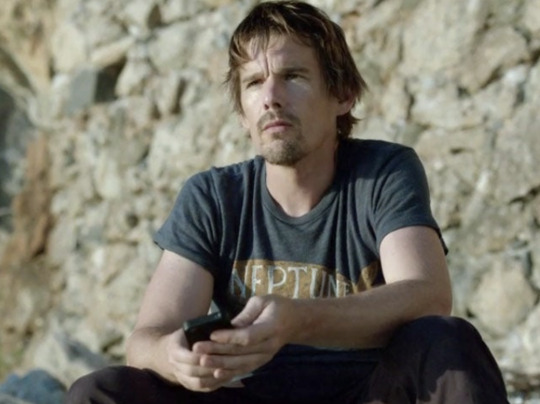
When asked during his first ever on-camera interview if he’d like to continue acting, a young Ethan Hawke replied, “I don’t know if it’s going to be there, but I’d like to do it.” He then gives a guileless shrug of relief as the interview ends, wiping imaginary sweat off his brow. The simultaneous fusion of his nervous energy and poised body language will be familiar to those who’ve seen later interviews with the actor. The practicality and wisdom he exudes at such a young age would prove to be a through-line of his nearly 40-year career. In an interview many decades later, he told Ideas Tap that many children get into acting because they’re seeking attention, but those who find their calling in the craft discover that a “desire to communicate and to share and to be a part of something bigger than yourself takes over, a certain craftsmanship—and that will bring you a lot of pleasure.”
Through Hawke’s dedication to his craft, we’ve also seen his maturation as a person unfold on screen. Though none of his roles are traditionally what we think of when we think of autobiography, many of Hawke’s roles, as well as his work as a writer, suggest a sort of fictional autobiographical lineage. While these highlights in his career are not strictly autofiction, one can trace Hawke’s Künstlerromanesque trajectory from his childhood ambitions to his life now as a man dedicated to art, not greatness.
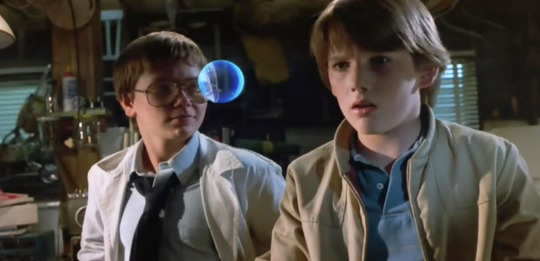
Hawke’s first two films, Joe Dante’s sci-fi fantasy Explorers with River Phoenix and Peter Weir’s Dead Poets Society with Robin Williams, set the tone for a diverse filmography filled with popcorn fare and indie cinema in equal measure, but they also served as touchstones in his development as person drawn to self-expression through art. In an interview with Rolling Stone’s David Fear, Hawke spoke about the impact of these two films on him as an actor. When River Phoenix, his friend and co-star in Explorers, had his life cut short by a drug overdose, it hit Hawke personally. He saw from the inside what Hollywood was capable of doing to young people with talent. Hawke never attempted to break out, to become a star. He did the work he loved and kept the wild Hollywood lifestyle mostly at arm’s length.
Like any good film of this genre, Dead Poets Society is not just a film about characters coming of age, but a film that guides the viewer as well, if they are open to its message. Hawke’s performance as repressed schoolboy Todd in the film is mostly internal, all reactions and penetrating glances, rather than grandiose movements or speeches. Through his nervy body language and searching gaze, you can feel both how closed off to the world Todd is, and yet how willing he is to let change in. Hawke has said working on this film taught him that art has a real power, that it can affect people deeply. This ethos permeates many of the characters Hawke has inhabited in his career.
In Dead Poets Society, Mr. Keating (Robin Williams) tells the boys that we read and write poetry because the human race is full of passion. He insists, “poetry, beauty, romance, love—these are what we stay alive for.” Hawke gave a 2020 TEDTalk entitled Give Yourself Permission To Be Creative, in which he explored what it means to be creative, pushing viewers to ask themselves if they think human creativity matters. In response to his own question, he said “Most people don’t spend a lot of time thinking about poetry, right? They have a life to live and they’re not really that concerned with Allen Ginsberg’s poems, or anybody’s poems, until their father dies, they go to a funeral, you lose a child, somebody breaks your heart, they don’t love you anymore, and all of the sudden you’re desperate for making sense out of this life and ‘has anyone ever felt this bad before? How did they come out of this cloud?’ Or the inverse, something great. You meet somebody and your heart explodes. You love them so much, you can’t even see straight, you know, you’re dizzy. ‘Did anybody feel like this before? What is happening to me?’ And that’s when art is not a luxury. It’s actually sustenance. We need it.”
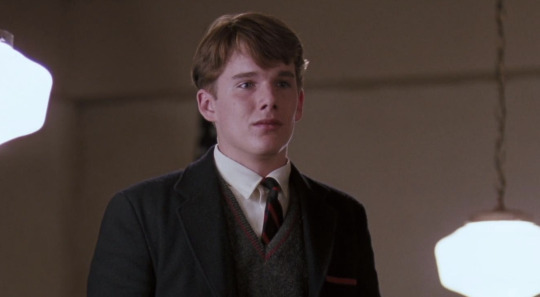
Throughout many of his roles post-Dead Poets Society, Hawke explores the nature of creativity through his embodiment of writers and musicians. Often these characters are searching for a greater purpose through art, while ultimately finding that human connection is the key. Without that human connection, their art is nothing.
We see the first germ of this attraction to portray creative people on screen with his performance as Troy Dyer in Reality Bites. As Troy Dyer, a philosophy-spouting college dropout turned grunge-band frontman in Reality Bites, Hawke was posited as a Gen-X hero. His inability to keep a job and his musician lifestyle were held in stark contrast to Ben Stiller’s yuppie TV exec Michael Grates. However in true slacker spirit, he isn’t actually committed to the art of music, often missing rehearsals, as Lelaina points out. Troy even uses his music at one point to humiliate Lelaina, dedicating a rendition of “Add It Up” by Violent Femmes to her. The lyrics add insult to injury as earlier that day he snuck out of her room after the two had sex for the first time. Troy’s lack of commitment to his music matches his inability to commit to those relationships in his life that mean the most to him.
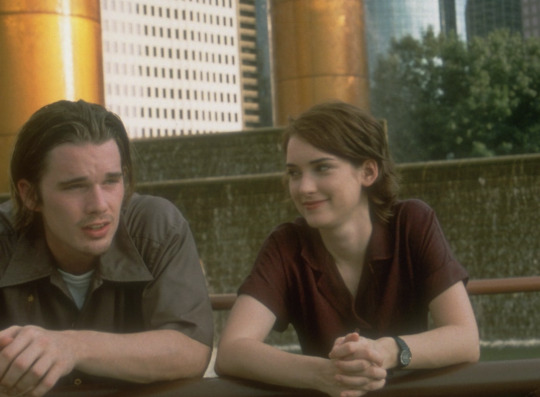
Reality Bites is also where he first positioned himself as one of the great orators of modern cinema.” Take this early monologue, in which he outlines his beliefs to Winona Ryder’s would-be documentarian Lelaina Pierce: “There’s no point to any of this. It’s all just a random lottery of meaningless tragedy and a series of near escapes. So I take pleasure in the details. You know, a quarter-pounder with cheese, those are good, the sky about ten minutes before it starts to rain, the moment where your laughter become a cackle, and I, I sit back and I smoke my Camel Straights and I ride my own melt.”
Hawke brings the same intense gaze to this performance as he did to Dead Poets Society, as if his eyes could swallow the world whole. But where Todd’s body language was walled-off, Troy’s is loud and boisterous. He’s quick to see the faults of those around him, but also the good things the world has to offer. It’s a pretty honest depiction of how self-centered your early-20s tend to be, where riding your own melt seems like the best option. As the film progresses, Troy lets others in, saying to Lelaina, “This is all we need. A couple of smokes, a cup of coffee, and a little bit of conversation. You, me and five bucks.”
Like the character, Hawke was in his early twenties and as he would continue to philosophize through other characters, they would age along with him and so would their takes on the world. If you only engage with anyone at one phase in their life, you do a disservice to the arc of human existence. We have the ability to grow and change as we learn who we are and become less self-centered. In Hawke’s career, there’s no better example of this than his multi-film turn as Jesse in the Before Trilogy. While the creation of Jesse and Celine are credited to writer-director Richard Linklater and his writing partner Kim Krizan, much of what made it to the screen even as early as the first film were filtered through the life experiences of Hawke and his co-star Julie Delpy.
In a Q&A with Jess Walter promoting his most recent novel A Bright Ray of Darkness, Hawke said that Jesse from the Before Trilogy is like an alt-universe version of himself, and through them we can see the self-awareness and curiosity present in the early ET interview grow into the the kind of man Keating from Dead Poets Society urged his students to become.
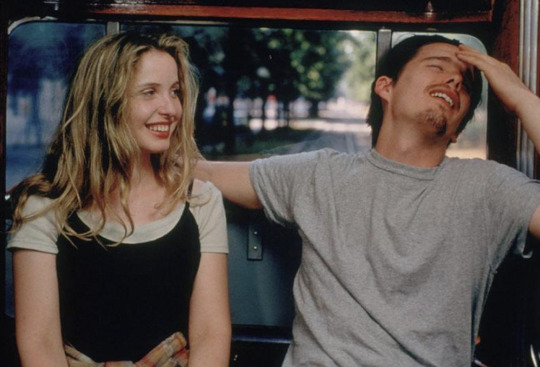
In Before Sunrise, Hawke’s Jesse is roughly the same age as Troy in Reality Bites, and as such is still in a narcissistic phase of his life. After spending several romantic hours with Celine in Vienna, the two share their thoughts about relationships. Celine says she wants to be her own person, but that she also desperately wants to love and be loved. Jesse shares this monologue, “Sometimes I dream about being a good father and a good husband. And sometimes it feels really close. But then other times it seems silly, like it would ruin my whole life. And it’s not just a fear of commitment or that I’m incapable of caring or loving because. . . I can. It’s just that, if I’m totally honest with myself, I think I’d rather die knowing that I was really good at something. That I had excelled in some way than that I’d just been in a nice, caring relationship.”
The film ends without the audience knowing if Jesse and Celine ever see each other again. That initial shock is unfortunately now not quite as impactful if you are aware of the sequels. But I think it is an astute look at two people who meet when they are still discovering who they are. Still growing. Jesse, at least, is definitely not ready for any kind of commitment. Then of course, we find out in Before Sunset that he’s fumbled his way into marriage and fatherhood, and while he’s excelling at the latter, he’s failing at the former.
As in Reality Bites, Hawke explores the dynamics of band life again in Before Sunset, when Jesse recalls to Celine how he was in a band, but they were too obsessed with getting a deal to truly enjoy the process of making music. He says to her, “You know, it's all we talked about, it was all we thought about, getting bigger shows, and everything was just...focused on the future, all the time. And now, the band doesn't even exist anymore, right? And looking back at the... at the shows we did play, even rehearsing... You know, it was just so much fun! Now I'd be able to enjoy every minute of it.”
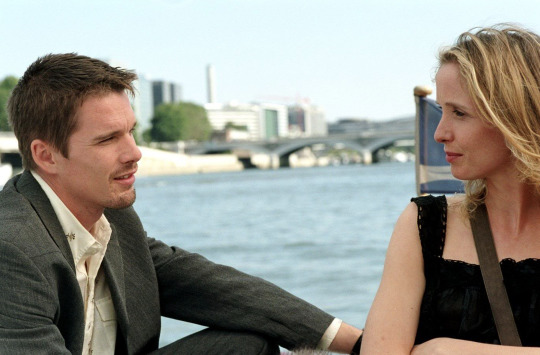
The filming of Before Sunset happened to coincide with the dissolution of Hawke’s first marriage. And while these films are not autobiographical, everyone involved have stated that they’ve added personal elements to their characters. They even poke fun at it in the opening scene when a journalist asks how autobiographical Jesse’s novel is. True to form, he responds with a monologue, “Well, I mean, isn’t everything autobiographical? I mean, we all see the world through our own tiny keyhole, right? I mean, I always think of Thomas Wolfe, you know. Have you ever seen that little one page note to reader in the front of Look Homeward, Angel, right? You know what I'm talking about? Anyway, he says that we are the sum of all the moments of our lives, and that, anybody who sits down to write is gonna use the clay of their own life, that you can’t avoid that.”
While Before Sunset was shot in 2003, released in 2004 and this monologue refers to the fictional book within the trilogy entitled This Time, Hawke would take this same approach more than a decade later with his novel A Bright Ray of Darkness.
In the novel, Hawke crafts a quasi-autobiographical story, using his experience in theater to work through the perspective he now has on his failed marriage to Uma Thurman. Much like Jesse in Before Sunset, Hawke is reluctant to call the book autobiographical, but the parallels to his own divorce are evident. And as Jesse paraphrased Wolfe, isn’t everything we do autobiographical? In the book, movie star William Harding has blown up his seemingly picture-perfect marriage with a pop star by having an affair while filming on location in South Africa. The book, structured in scenes and acts like a play, follows the aftermath as he navigates his impending divorce, his relationship with his small children, and his performance as Hotspur in a production of Henry IV on Broadway.
Throughout much of the novel, William looks back at the mistakes he made that led to the breakup of his marriage. He’s now in his 30s and has the clarity to see how selfish he was in his 20s. Hawke, however, was in his forties while writing the book. Through the layers of hindsight, you can feel how Hawke has processed not just the painful emotional growth spurt of his 20s, but also the way he can now mine the wisdom that comes from true reflection. Still, as steeped as the novel is in self-reflection, it does not claim to have all the answers. In fact, it offers William, as well as the readers, more questions to contemplate than it does answers.
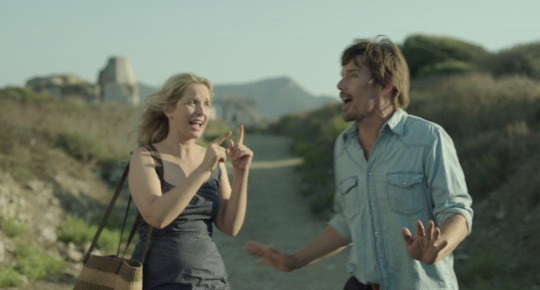
The wisdom to know that you will never quite understand everything is broached by Hawke early in the third film in the Before Trilogy, 2013’s Before Midnight. At this point in their love story, Jesse’s marriage has ended and he and Celine are parents to twin girls. Jesse has released two more books: That Time, which recounts the events of the previous film, and Temporary Cast Members of a Long-Running But Little Seen Production of a Play Called Fleeting. Before Midnight breaks the bewitching spell of the first two films by adding more cast members and showing the friction that comes with an attempt to grow old with someone. When discussing his three books, a young man says the title of his third is too long, Jesse says it wasn’t as well loved, and an older professor friend says it’s his best book because it’s more ambitious. It seems Linklater and company already knew how the departure of this third film might be regarded by fans. But it is this very departure that shows their commitment to honestly showing the passage of time and our relationship to it.
About halfway through the film Jesse and Celine depart the Greek villa where they have been spending the summer, and we finally get a one-on-one conversation like we’re used to with these films. In one exchange, I feel they summarize the point of the entire trilogy, and possibly Hawke’s entire ethos:
Jesse: Every year, I just seem to get a little bit more humbled and more overwhelmed about all the things I’m never going to know or understand.
Celine: That’s what I keep telling you. You know nothing!
Jesse: I know, I know! I'm coming around!
[Celine and Jesse laugh.]
Celine: But not knowing is not so bad. I mean, the point is to be looking, searching. To stay hungry, right?
Throughout the series, Linklater, Delpy, and Hawke explore what they call the “transient nature of everything.” Jesse says his books are less about time and more about perception. It’s the rare person who can assess themselves or the world around them acutely in the present. For most of us, it takes time and self-reflection to come to any sort of understanding about our own nature. Before Midnight asks us to look back at the first two films with honesty, to remove the romantic lens with which they first appeared to us. It asks us to reevaluate what romance even truly is.

Hawke explores this same concept again in the 2018 romantic comedy Juliet, Naked. In this adaptation of the 2009 Nick Hornby novel, Hawke plays a washed-up singer-songwriter named Tucker Crowe. He had a big hit album, Juliet, in the early ‘90s and then disappeared into obscurity. Rose Bryne plays a woman named Annie whose longtime boyfriend Duncan is obsessed with the singer and the album, stuck on the way the bummer songs about a bad breakup make him feel. As the film begins, Annie reveals that she thinks she’s wasted 15 years of her life with this schmuck. This being a rom-com, we know that Hawke and Byrne’s characters will eventually meet-cute. What’s so revelatory about the film is its raw depiction of how hard it is for many to reassess who they really are later in life.
Duncan is stuck as the self-obsessed, self-pitying person he likely was when Annie first met him, but she reveals he was so unlike anyone else in her remote town that she looked the other way for far too long. Now it’s almost too late. By chance, she connects with Crowe and finds a different kind of man.
See, when Crowe wrote Juliet, he also was a navel-gazing twentysomething whose emotional development had not yet reached the point of being able to see both sides in a romantic entanglement. He worked through his heartbreak through art, and though it spoke to other people, he didn’t think about the woman or her feelings on the subject. In a way, Crowe’s music sounds a bit like what Reality Bites’s Troy Dyer may have written, if he ever had the drive to actually work at his music. Eventually, it’s revealed that Crowe walked away from it all when Julie, the woman who broke his heart, confronted him with their child—something he was well aware of, but from which he had been running away. Faced with the harsh reality of his actions and the ramifications they had on the world beyond his own feelings, he ran even farther away from responsibility. In telling the story to Annie, he says, “I couldn’t play any of those songs anymore, you know? After that, I just... I couldn’t play these insipid, self-pitying songs about Julie breaking my heart. You know, they were a joke. And before I know it, a couple of decades have gone by and some doctor hands me... hands me Jackson. I hold him, you know, and I look at him. And I know that this boy. . . is my last chance.”
When we first meet Crowe, he’s now dedicated his life to raising his youngest son, having at this point messed up with four previous children. The many facets of parenthood is something that shows up in Hawke’s later body of work many times, in projects as wholly different as Brooklyn’s Finest, Before Midnight, Boyhood, Maggie’s Plan, First Reformed, and even his novel A Bright Ray of Darkness. In each of these projects, decisions made by Hawke’s characters have a big impact on their children’s lives. These films explore the financial pressures of parenthood, the quirks of blended families, the impact of absent fathers, and even the tragedy of a father’s wishes acquiesced without question. Hawke’s take on parenthood is that of flawed men always striving to overcome the worst of themselves for the betterment of the next generation, often with mixed results.
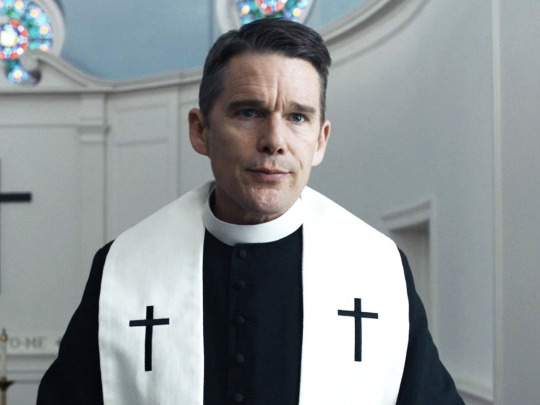
Where Juliet, Naked showed a potential arc of redemption for a father gone astray, First Reformed paints a bleaker portrait. Hawke plays Pastor Toller, a man of the cloth struggling with his own faith who attempts to counsel an environmental activist whose impending fatherhood has driven him to suicidal despair. Toller himself is struggling under the weight of fatherhood, believing he sent his own son to die a needless death in a morally bankrupt war. Sharing the story, he says “My father taught at VMI. I encouraged my son to enlist. It was the family tradition. Like his father, his grandfather. Patriotic tradition. My wife was very opposed. But he enlisted against her wishes. . . . Six months later he was killed in Iraq. There was no moral justification for this conflict. My wife could not live with me after that. Who could blame her? I left the military. Reverend Jeffers at Abundant Life Church heard about my situation. They offered me a position at First Reformed. And here I am.” How do we carry the weight of actions that affect lives that are not even our own?
If Peter Weir set the father figure template in Dead Poets Society, and Paul Schrader explored the consequences of direct parental influence on their children’s lives, director Richard Linklater subverts the idea of a mentor-guide in Boyhood, showing both parents are as lost as the kid himself. When young Mason (Ellar Coltrane) asks his dad (Hawke) what’s the point of everything, his reply is “I sure as shit don’t know. Nobody does. We’re all just winging it.” As the film ends, Mason sits atop a mountain with a new friend he’s made in the dorms discussing time. She says that everyone is always talking about seize the moment—carpe diem!—but she thinks it’s the other way around. That the moments seize us. In Reality Bites, Troy gets annoyed at Lelaina’s constant need to “memorex” everything with her camcorder, yet Boyhood is a film about capturing a life over a 12-year period. The Before Trilogy checks in on Jesse and Celine every nine years. Hawke’s entire career. in fact, has captured his growth from an awkward teen to a prolific artist and devoted father, a master of his craft and philosopher at heart.

#ethan hawke#boyhood#before trilogy#before midnight#before sunset#before sunrise#reality bites#first reformed#dead poets society#a bright ray of darkness#film writing#film essay#musings#oscilloscope laboratories
140 notes
·
View notes
Text
题西林壁 - Written On this Wall in Xilin
by 苏轼 (Su Shi, 1037 - 1101)
横看成岭侧成峰
héng kàn chéng lǐng cè chéng fēng
Across, look - it’s a mountain range, sideways, a towering summit;
远近高低各不同
yuǎnjìn gāodī gè bù tóng
from far to near, from high to low, every angle a world of its own.
不识庐山真面目
bù shí lúshān zhēn miànmù
One does not perceive the true face of Mt. Lu,
只缘身在此山中
zhǐ yuán shēn zài cǐ shān zhōng
only because they still stand amidst its valleys and peaks.

(Source)
This is a copy. Carved on a wall at the Xilin Temple of Mt. Lu and then moved to the Donglin Temple some time later, the original has been lost to time.
.........................................................................................................
Another homework poem! I should start tagging them xD
Did a quick translation with zero context while stuck in the washroom. It was very amusing! As was wolf whistling Mt Lulu with friends ~
Anyway, I also got the vibe that there was a story here somewhere and thought it would be fun to investigate as much as I am able to! When I’m done with these notes, I shall try for another translation which will be the face for this post xD But I’ll also keep the fun tl in at the end.
Notes
TRANSLATION
This is a very straightforward seven character quatrain with a rhymed second and fourth line. It was written in the Song Dynasty by the poet better known as Su Dongpo - yes I was surprised as well, such a famous line and from a Song Dynasty poem? They aren’t just known for their lyrics! I wonder which other everyday idiom has similar origins...
So the lines in this poem themselves don’t actually need clarification.
A visitor to the 庐山 Lu Mountain has covered quite a lot of ground, looking at it from end to end and seeing it as a mountain range. Then staring at it from one end, it looks like just one towering mountain. From when he approached he saw the range and the summit; when he was close, when he climbed up and then all along his descent, every vantage point rewarded him with a different, gorgeous view and field of vision. Puzzled though, he sat and wondered which is ‘real’? And then he realized, all of them and none of them at once. Because... I am still in the mountain.
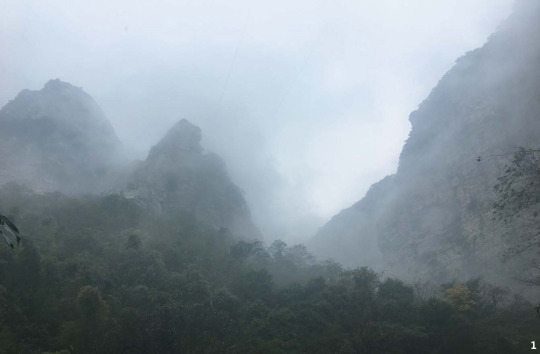
For anyone who is wondering Mt. Lu... where is this again?
Recognize this picture? (You might if you watch cdrama) Yup! This is one of the scenic sights within Mt Lu xD

(Source)
I felt a little let down after reading the poem initially.
不识庐山真面目 // one does not perceive the true face of Mt. Lu
Like oh, so you mean this?
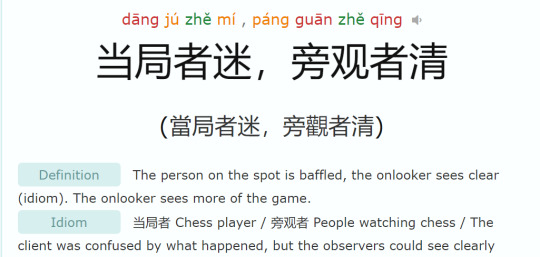
So easy?
But the truth is HAH! The person who most needs a better view often doesn’t know how much they need it. (Me, I’m talking about ME)
In the process of looking up details of the ‘background section’, and how to better illustrate it, I came across many photos of Mt. Lu.
This is 望江亭 // Riverwatch Pavilion
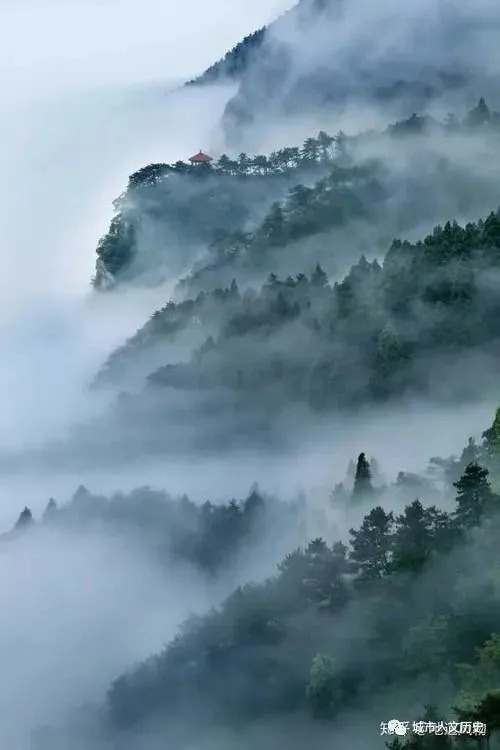
This is the same 望江亭 // Riverwatch Pavilion

Stone carvings by 黄龙潭 // Yellow River Springs

This is 如琴湖 // Ruqin Lake

Again 如琴湖 // Ruqin Lake, different season, different POV.

Some branches... mmmm...
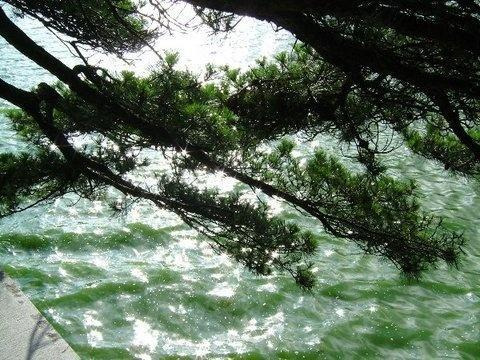
My favourite pavilion is the 观云亭 // Cloudwatch Pavilion
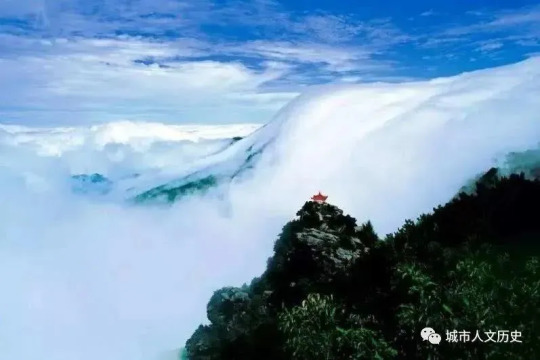
Less ethereal but still enticing! 观云亭 // Cloudwatch Pavilion!
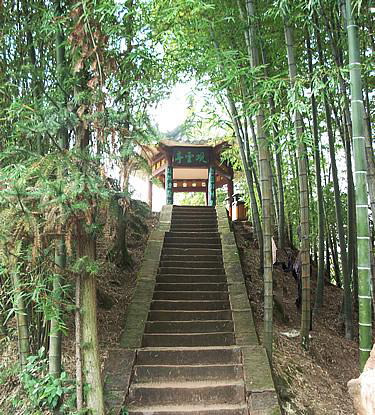
(Source)
Truly magical! 观云亭 // Cloudwatch Pavilion again.
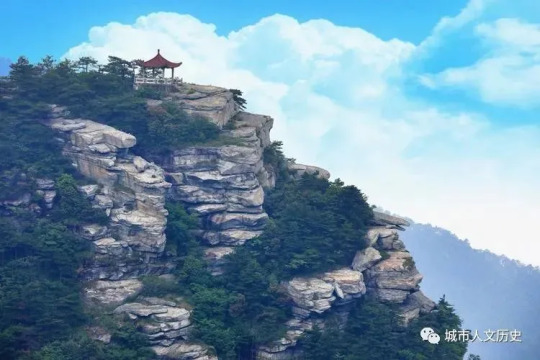
Do you want another angle of 观云亭 // Cloudwatch Pavilion?

(Source)
Maybe enough with the pavilions.
There’s tea!
Jiangxi Mt. Lu Green Tea Field

Snow at 含鄱口 // Hanpokou

Another location? No! 含鄱口 // Hanpokou again :)

Random bridge!
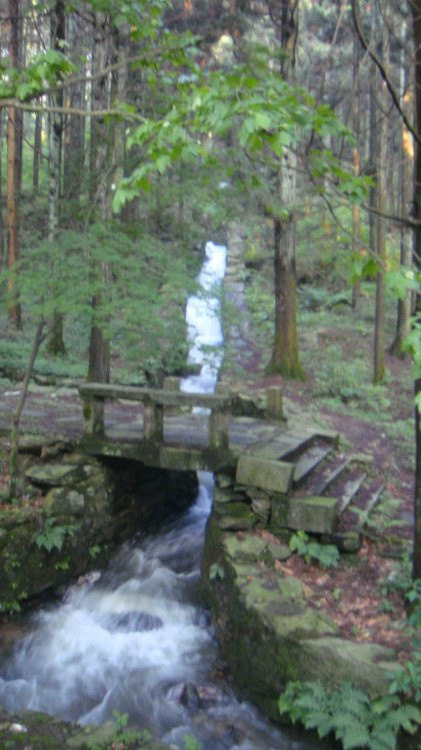
状元桥 // Top Scholar’s Bridge... I wonder who visits? xD

A Mt Lu sunset at 含鄱亭 // Hanpo Pavilion
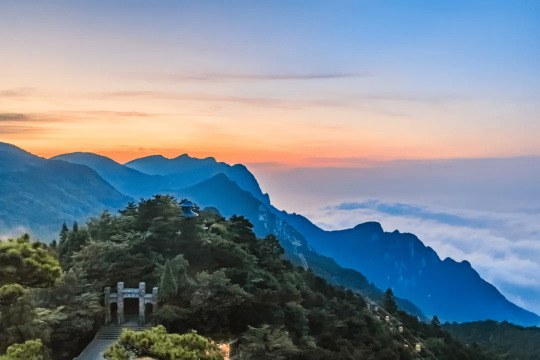
At some point, I was like wait a minute, just how big is this mountain?
(As below)

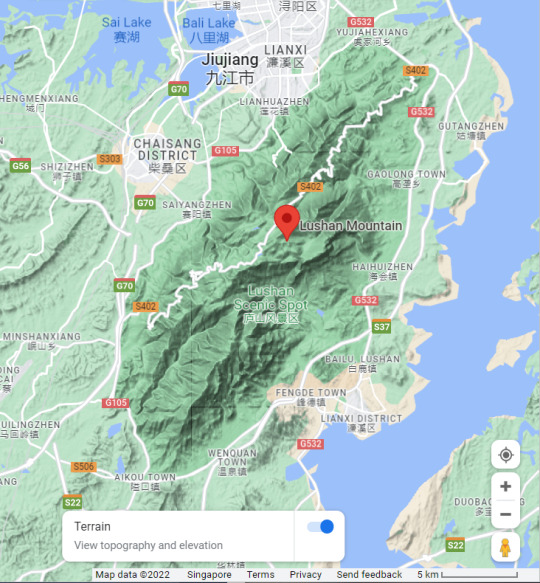
Google map

(Source)
Ah.
I don’t know how Mt Lu looks like. Every view is different - suddenly, that sentence made a world of sense. No matter where I am, it’s going to be different. Like if I look at a pavilion from below and compare that with how it looks from a nearby peak, or when standing right in front of it. And that’s just one spot!
Yes dear. And you are confused because you’re right smack in the middle of it all, trying to describe 25km x 10km of mountain with what you see in in two 24mm eyes. That’s impossible to achieve.
Maybe take a step back and reframe your question?
HISTORY
Relegation was a very common method of punishment for officials who had been convicted of crimes. This was a distinct punishment from exile, in which the criminal is sent to distant backwaters, often with harsh conditions. Officials sentenced to relegations did not lose their positions as officials, they were demoted and posted to locations distant from the central government and court. Besides a demotion, how far away they were sent was an indication of the severity of the crime. They could not resign and just live as commoners, instead, they may be given a title with no actual power and be thus forced to serve out their sentence there. [x]
The period of relegation that got Su Shi, of Song Dynasty, his name of Su Dongpo began in the year 1080, when he was convicted of insulting the Emperor for a poem he wrote criticizing political reforms. With a nominal official’s title that did not confer any power on him except to tie him down to the area, off he was sent to Huangzhou!
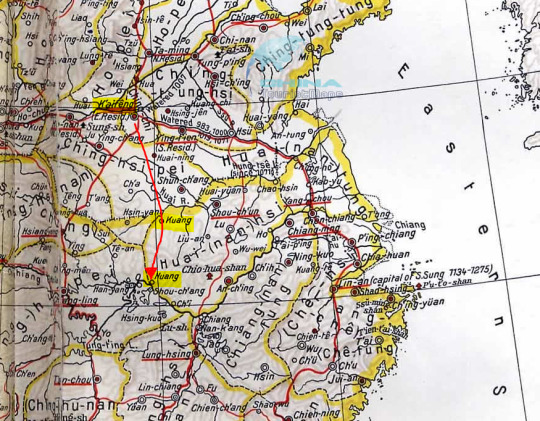
(Notes for basis of passing through Guangzhou, Kuang in wade giles)
(Source)
The poem he wrote which very cleverly drags this situation made me smile. He was 45 at this time, and the faction that played a key role in his banishment was new. Do not doubt how big of a blow this relegation was. Hope for a pardon was so dim as to be almost nonexistent. And yet, he sees the humor in the situation and makes fun of it! (But also, my bro, I guess you never learnt to shut it, did you?)
His family came to him in the first year and they stayed together, living frugally. With the help of a poor scholar friend by the name of Ma Zhengqing, in the second year, he got a little plot of land, which was on an old army camp East of the city. We know this because he wrote some poems about his experiences on this Eastern Slope 东坡 (Dong Po) from which he got his nickname.
We remember Ma Zhengqing because of Su Dongpo. But maybe without Ma Zhengqing, there would not have been a Su Dongpo. Interesting how these things happen, isn’t it?
Fun fact: It was during this period that he wrote his Chibi poems!
In the fourth month of 1084, Su Shi was recalled from Huangzhou. With a new emperor and new government, he was still under the relegation sentence, but his new location became Ruzhou.
Which… please see for yourself below. I mapped it out on google maps based on present day locations, though I also eyeballed the distance on other Chinese maps of the Song Dynasty to confirm. This is just needed to show the walking distance for impact.
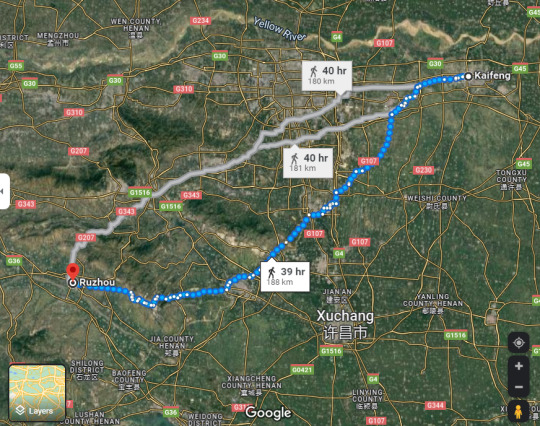
NOW I’m quite tired from scrolling through google maps*flops on the floor*.
Here’s the entirely water based route he could have taken… just following the blue lines (waterways) on google maps and joining them together. However, this does not account for the direction of the river’s flow, nor for any construction or whatnot that has happened over nearly a thousand years.
(Good gods, this trip looks exhausting. How long did he take to complete it? A year???)
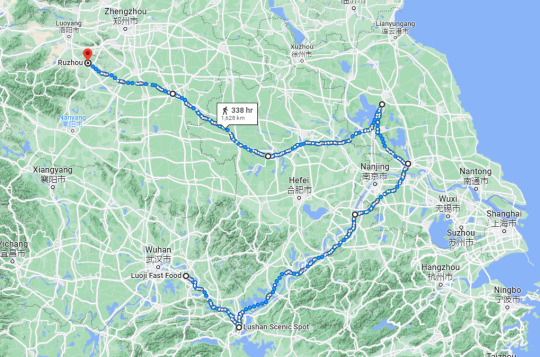
Here’s the link to the map I made with latitude and longitudes indicated with a * below. If for whatever reason, you also want to stalk blue lines across google maps, you’re welcome to reference the full list. And if you know anything about the actual route, please contact me! I really want to know.
https://goo.gl/maps/uFKGrxTFZPqToFBX7
Huangzhou - 30.433872962245427, 114.88129769733013*
Yangtze River - 30.377781819827735, 115.07101171640872
Lushan Maintain - 29.512493686853997, 115.97992335630641*
Jiujiang - 29.655519332862937, 115.95199503510239
Yangtze River - 31.52268831477707, 118.3835515008836*
joins - 32.25937931638017, 119.4709085685721
Jinghang Yunhe - 32.42372696795087, 119.48513109148513*
Jinghang Yunhe - 33.56999997351908, 118.97126706569289
Huaishu River - 33.45610953325041, 118.94490546438135*
Huaihe River - 32.54604115026407, 116.58836355764417*
joins - 32.500902310509126, 116.52398860951106
Yinghe River - 33.63248728287315, 114.61038506349661*
Shahe River - 33.69194084968913, 113.60587536388371
Ruhe River - 34.146226764936046, 112.8221271332927
Ruzhou - 34.16581654981741, 112.84447346106711*
Anyway, so this has all been to give a bit of background on how Su Shi found himself passing by Mt. Lu. From Huangzhou, he followed the Yangtze to Jiujiang, and from there he had the opportunity to visit Mt. Lu and went for it.
After the visit concluded, he enjoyed it so much that he eventually recorded it in 《东坡志林》 which can be read as Dongpo’s Forest of Records or Dongpo’s Records of Forests, both of which are very cute names for a travelogue.
The account can be found in Chapter 1 of the notes, under the name: 《记游·记游庐山》 , and the tone of it is so so charming!
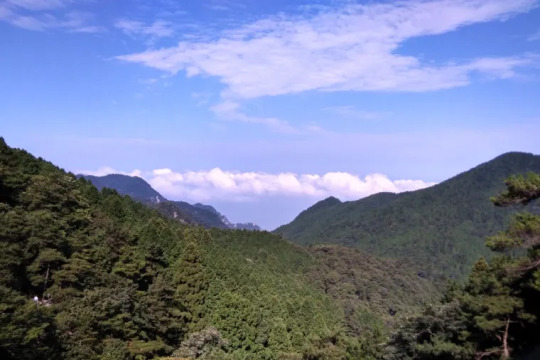
(Source)
When he first got there, the scenery was fantastically beautiful. It was nothing like anything he had ever seen before, and overwhelmed by the beauty he had thought he would very likely not have the time for poetry. So he proceeded to declare he had no intention of writing any poetry.
(Like how we all say, no need to take photos, no photo can record the beauty that eyes can see xD but in much the same way, we all know what happens to that right?)
But afterwards, he met some monks who lived in the mountain who all exclaimed in excitement or surprise.
“Su Zizhan* has come!”
*子瞻, Su Shi’s courtesy name
And ‘involuntarily’, he composed a quatrain which he provided in his notes.
芒鞵青竹杖 | With rush shoes and green bamboo staff,
自挂百钱游 | upon it, a hundred coins hung, off I roam!
可怪深山里 | How very odd, deep in the mountains here
人人识故侯 | everyone recognizes some old official.
(Su Shi, probably: I’m popular! Hehe.)
And immediately, he smiled at the absurdity of his verse and wrote two more xD
(yjtc: bro, what happened to no poems today?)
青山若无素 | Green mountain, whom I have not met before,
偃蹇不相亲 | like a haughty stranger, not approachable at all.
要识庐山面 | Want to know Mt. Lu's face?
他年是故人 | Then become acquainted in the years to come.
自昔忆清赏 | From before, I recall admiring its grace in works,
神游杳蔼间 | in spirit, exploring amidst the moss and vine.
如今不是梦 | Now this is no dream,
真个是庐山 | it really is Mt Lu.
The next day, he was reading the book his friend Chen Lingju had handed to him, 《庐山记》 ~ Notes on Mt Lu as he walked. He saw poems from 李白 Li Bai and 徐凝 Xu Ning, and something about them amused him very much and he laughed. Later, his steps took him into Kaixian Temple where the monks requested a poem. For them, he wrote the following:
帝遣银河一派垂 | The Heavenly Emperor sends the Silver River [1] gushing down;
古来惟有谪仙辞 | in all of time, only one Immortal's [2] verse can be called thus.
飞流溅沫知多少 | The flying waters splash and foam, who knows how much?
不与徐凝洗恶诗 | It will not wash Xu Ning's terrible poem [3].
[1] Milky Way / Alludes to Li Bai's poem about Mt Lu's waterfall 《望庐山瀑布》,
[2] 谪仙 is an deity sent to the mortal realm. Li Bai was known as the 诗仙 / poetry immortal
[3] Xu Ning’s Mt. Lu waterfall poem《庐山瀑布》
He took about ten days or a little more to explore the Southern side of the mountain. Then concluded that there were too many gorgeous places to list and discuss, but of these, 漱玉亭 (Jade Pavilion) and 三峡桥 (Three Gorges Bridge) were the best to him. And thus he wrote two more poems about them, which you may read translated here.
漱玉亭 // Jade Wash Pavilion

(Source)
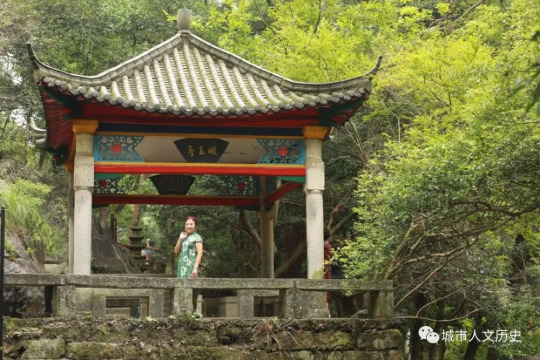
(Source)
三峡桥 // Three Gorges Bridge
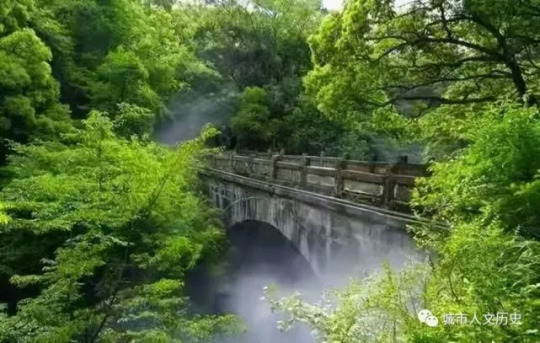
(Source)
And here we have a Ming Dynasty illustration of the same place.

(Source)
Finally, finally, he paired up with a friend he calls Old Zong (this bears a little more research), to explore the West Forest together. During this time, he wrote his final Mt Lu poem, which is also his most well known one.
横看成岭侧成峰 | Across, look - it’s a mountain range, sideways, a towering summit,
远近高低各不同 | from far to near, from high to low, every angle a world of its own.
不识庐山真面目 | One does not perceive the true face of Mt. Lu.
只缘身在此山中 | because they still stand amidst its valleys and peaks.
And I feel like, having had this experience of trekking through the mountain, all the interesting encounters, reading about other people's thoughts, he also took the time to reflect on his own feelings and reactions. Maybe this philosophical view of the world was something he already was nursing, and this metaphor with Mt. Lu was a good way to express it. Maybe he didn't have the voice, and the little holiday inspired him?
Who knows!
But having had the tinest of peeks into some of the events that happened leading to and also on this trip, knowing that this was the closing of a paragraph in his life, no wonder it got famous!
.......................... —ฅ/ᐠ. ̫ .ᐟ\ฅ —..........................
cross section see as long, side become tall
far near high low each got something more
don't know lu mountain true face how to see
only fate cos your body in mountain be
Your thoughts, your beliefs and even your questions limit you from seeing the true nature of things.
#题西林壁#苏轼#Su Dongpo#my favourite song has a line that goes#who knows which line will be sung and passed on forevermore#谁知道哪一句会千古吟传#it's so TRUE#objectively simple but my brain sure tied itself in knots#it's not leaving the mountain physically to get a better look at it#it's the knowing of where you are and understanding the context#and then asking the right question#but to do that you have to take a step back and see your situation for what it is#Maybe where you stand does limit what you perceive...#but if you think that is a Problem then you have not seen Mt Lu's true face#commentary#poems
15 notes
·
View notes
Text
➵ chan, son of dionysus ➵

Pairing: self insert, gender neutral reader x bang chan
Genre: fluff n’ smut
Tags: demigod au, inspired by PJO, sonofdionysus!chan, softdom!chan, lil bit of magic and enchantment, mentions of wine, outdoor sex, unprotected sex (stay safe lovelies!), creampie, praising, usage of pet names, lil bit of teasing, oral (r receiving), light bondage (ribbons), all kinds of sensory stuff
Word count: 1.7k
demigod!skz mini-masterlist coming soon
{swear on the river styx?}
Madness. This was where your love and disdain for Chan began and ended. He had caught you in his spell, and now, there was no going back. He was always good at getting what he wanted.
You were his all the way from the grass tickling your fingers on the edge of the picnic blanket to your bare toes kissed with the warmth of the summer sun.
Being alone with Chan was like being in a haze, a purple haze, more specifically--one that felt like an illusion, like he had you locked up in some kind of mirage. All that you could see and feel was him: his fingers slipped down the sides of your body, singing spells with his kisses into your collarbones and fluttering on your lips.
Chan was soothing like waves upon an ocean shore in the way that he would roll his body weight over you, pressing himself into you as if he was trying to consume you and make you one being. You wouldn’t have minded.
Madness was in his deep violet eyes that would make you feel dizzied. In the light of the afternoon, they sparkled and dripped in vice like the wine that he would bring to your lips. It was his elixir, somehow it would taste different every time. Chan would suck the bitterness of the grapes off your skin, but he always tasted sweeter.
Other times, he would lay simply with you, hidden in the grape leaves, tracing little designs into your arm with his fingertip. Chan recited poems for you, and monologues from plays in languages that you couldn’t understand, but they sounded beautiful coming from his mouth.
Your madness for him grew when he would weave little sprigs of lilac into your hair, humming a little tune for you until you would feel your eyes grow heavy with the allure of sleep; mauve under your eyelids which he too would kiss.
“Forever you’ll be mine, and I’ll be yours.”
Songbirds tittered in that vast vineyard, dotting the cloudless cerulean sky which would turn into a blur on those afternoons. His touch was softer than the breeze, and tickled at you too.
“You’ve been waiting for me, haven’t you?”
Chan tucks up the corners of your shirt then greedily works at the buttons and holes that let in the summer heat. He bites into your neck lightly, and the scent of lilac fastens to his naturally earthy scent: it’s almost like the smell of an electric atmosphere following the downpouring of rain.
He tucks his thigh between the pooling heat of your legs and bows over you like the willows nearest to the edge of forest guarding his father’s vineyard. He sweeps you into his arms, tangling his limbs and yours.
“There’s nothing more beautiful than you.”
He sweeps up your face in his hands, thumbing over your cheeks and giving you every bit of this sweetness: like cherries, like honey and nectarines. Chan’s kisses are like some kind of enchantment and the way that his tongue carefully passes yours is almost lyrical.
Chan weaves vines down your body of kisses, never breaking those violet eyes with you. The picnic blanket crinkles a little as he helps you shimmy out of your bottoms. He hovers his mouth over your dripping arousal. He then uses his hands to spread your legs farther, but he doesn’t need to do too much. His golden hair is like the soft threads of barely in your fingertips, and he hums into your twitching excitement. Your hips buckle into his praise,
“That’s it angel.”
Using both his hand and his mouth, Chan wets you further with his tongue. He spreads out his tongue flat to tease at you slowly, and with each return of his muscle, he brings you closer and closer to your brink. By now, your tossing body has strewn the blanket enough that the grass has become your pillow, and it tickles at the tips of your ears.
You’re drunk on him when he finally lets you feel him wholly, and he rubs harder, faster. Your body quivers at the way that his pink tongue looks pleasuring you like this, it’s just about enough to make you release into his mouth, just of him.
Cicadas hiss, and your incessant whimpers become one in the same with them.
Golden trellises string his determined and hooded eyes when he steals away all sensation from you to nibble gently at your inner thighs.
“Not yet my love, I’ll make you mine soon enough.”
Your gasping body is an utter mess under him, and you rock your hips into his body for some kind of feeling. Under his silken shirt, the breeze whips into the contours of his muscles, and you claw into his body, tracing over every one of the curves you can find.
“Please...”
It’s likely through pure insanity that your body keens for him, and thirsts to be evermore under his touch and attention.
“Angel, I can give you everything that you want and more...just be patient.”
To his side, he detangles the satin gold ribbon from the bundle of wildflowers that he had brought for you.
Your neglected sex pivots up towards his body when he prowls over to your wrists to tie together both of your hands with the ribbon. He doesn’t tie it tight, merely trusting it for decoration, and you don’t dare to break free.
Chan frees himself from his own bottoms, choosing to linger over your bare body: a mixture of body heat and anticipation. His hardened member throbs on your stomach and you whine out carelessly just to feel him inside.
“No-no more, want you--want you so, so bad.”
‘What is it that you want my love?” He aligns himself with your entrance. “Say it.”
“I-I want you, and no one else. Can you please...deep...I-I can take it.”
Chan devours the way that your wrists flick in that golden ribbon that shines under the sun’s rays. You’re completely vulnerable to him, but you’ve never felt safer. There was something about his presence that was massively calming--like him simply existing there with you in that moment was all you would ever need.
His lips are connected to yours once more as he coaxes his dick in slowly. Just the simple action fills you with euphoria, and you’ve lost all sense of composure. His girth swells inside you, washing you over with a complete sense of intimacy with him that you know is irreplaceable. He bottoms out within you with a low groan, eyebrows helplessly twisted as he feels your walls tighten.
He begins his thrusts and each return is met with both of your shaking breaths in the air. Your hands trace over the shoulder blades flexing on his back, then you dig your nails into the gorgeous skin. Chan is quick in digging his hips as deeply as he can into you to hear you let out more and more rushed moans past your lips.
“Get up this way baby.”
Chan pulls your hips up, then flips you over on your knees to bring himself back to you. He guides your face into the fabric of the blanket, hands then quickly moving to grasp at your waist. The gold ribbon juxtaposes the green grass in your hands like some celestial combination.
From this angle, he hikes up your waist into the air and near to his member, now thrilled and pink as well. He enters you at last, and you’ve almost forgotten how full you had felt before--now, it’s even greater.
“S-so pretty for me my darling. You-you look so pretty like this.” Chan grunts the words out best he can. In your madness for him, he’s driven himself over the edge as well.
Skin on skin pats lightly and he digs into your ass with one hand, and returns back to your sex with the other, permitting it those last fleeting touches.
He barely had to touch you more before your body shook violently with your orgasm that left you light headed, much like the others. While the heat sears through all of your limbs, Chan chuckles at his feat, grinding down his hips even harder while he chases your overstimulation.
You’re delirious by the time that he manages one more orgasm out of you; the second one makes you much louder and less demure than you had been before.
“Want-want you inside, c-cum for me?”
“I just wanted you to have some of the fun first.”
“I said that I wanted you. I said I can take it.”
The purple flames in Chan’s eyes spark, and he’s renewed his pace, pumping in and out you slowly, up until he’s spewing more little praises into the summer air.
“Aren’t you so tight for me? Gods, you feel so--” He trails tiny grunts in the back of his throat, “--so good for me.”
“Chan--mm--just a little more...”
Chan melts into a pool of his orgasm and your pleading voice, grunting out unintelligible moans of sheer happiness and relief. Together, you linger there, staying the exact same, and relishing in the beauty of feeling one with another person--the one person that you wanted and loved most in the world.
After he removes himself from your entrance still in aftershocks, Chan watches his white seed glisten and drip out just slightly.
You swipe away those golden strands to kiss his sweating forehead. The summer wind blows coolly on your perspiration and you take his face into your hands to laugh slightly together. It’s those violet eyes that take care of you, and love you, and glisten like the way the cottonwoods mimic the ocean’s waves.
You were mad. Completely and utterly mad for him, an infatuation so deep, it was the kind that some would say would last for ages.
Chan held your hand as you both came down from your orgasms, and looked up at the clouds with you from that little corner riddled with vines of weeds and juicy purple grapes.
The purple haze consumes you, and for a moment, you can’t even distinguish the real from the mirage.
“Chan?”
“Mmhm?”
“I don’t ever want to leave here with you.”
#stray kids smut#skz smut#bang chan smut#chan smut#stray kids imagine#stray kids oneshots#stray kids drabbles#stray kids timestamps#stray kids fanfiction#stray kids fanfic#demigod au#bang chan x reader#bang chan x you#bang chan x y/n#chan x reader#chan x you#chan x y/n#i apologize if I have ruined anyone's childhoods with this au HA
332 notes
·
View notes